I have wavered back and forth, wondering if I should even attempt my often massive Best Books of the Year column. Some years it goes on for several posts, multiple parts, as there are so many good books to celebrate. It is stressful narrowing them down, asserting this one over that, when there are so, so many good books released each year. Book buying is down (and our sales have generally fallen each year for years, now) but writing and publishing is fantastic. I’ve got a huge stack and I’m trying to whittle it down.
And that is just the nonfiction stack. Oh my.
You may have heard me say that it is hard to announce a “best” book as the question always looms large for me: best for whom? Some books are too academic to be much good to ordinary folks while others are simply not that well written. Some are a bit too eccentric (which may be fabulous fun for some of us) and some are a bit too strict. What excites one theologian turns off another; ditto with most topics. Different strokes, you know…
I can tell you the titles that I most remember enjoying these past months. I can remind you of those that I hope folks order and read and discuss because, well, Ioved them.
I will list those that I think should appeal to many of our followers, books that have a vision of life — whether Christian or not — that will be for them wise and good. And fun.
Here, then, are most of my favorite (nonfiction) reads of the last year. I’m sure I’m leaving some out, so forgive me if your fav isn’t on the list. Each year I think I should keep a notebook, and each year in early January I kick myself for not having kept better records. Still, these are most of my very best books of 2024.
Almost all of these have been reviewed previously at earlier BookNotes; we invite you to visit the website and click on “BookNotes” to see the archives of all our previous reviews. Not only are there lots more good items recommended but you can find my original thoughts about most of these described below. That might be fun, or help if your unsure if you really want them. We’re at your service, so don’t hesitate to use the “inquiry” page or email us or call.
PLEASE ORDER BY CLICKING THE ORDER TAB AT THE VERY END. ALL BOOKS MENTIONED ARE DISCOUNTED — 20% OFF. Happy reading in the New Year.
FAVORITE NONFICTION BOOKS OF 2024
 Defiant Hope: Essays on Life, Faith, and Freedom Michael Gerson (Simon & Schuster) $28.99 // OUR SALE PRICE = $23.19
Defiant Hope: Essays on Life, Faith, and Freedom Michael Gerson (Simon & Schuster) $28.99 // OUR SALE PRICE = $23.19
As noted, we don’t really have a “Book of the Year” but if we did, this would perhaps be it. It would be our way of honoring a person who was an acquaintance to us and a friend to many. He worked in conservative politics (and wrote a book insisting that true conservatives should make central a concern for the poor and disadvantage, a title that soon enough caused frustration among many on the right.) Gerson was a speech-writer, a good one, for George W. Bush (and one the back cover there is a picture of the two of them, the President in shorts and a tee shirt and Mike in dress shirt and necktie.) He played an very large role helping the President craft some of the most generous and just foreign aid at a time when AIDS in Africa was still being ignored too many places. As a right-hand consultant to the President, he made a difference.
Later, when he became a full time journalist, with a column in the Washington Post he became a “never Trumper” and spoke clearly about first things, about important principles, about goodness and decency and faith and America.
This book collects some of his greatest work, essays grouped in all sorts of topics. His public discussion of his cancern and his mortality is here, as are some lovely pieces about faith and family, pets and hobbies. But most is public theology, if you will, civic-minded insights, good, thoughtful, inspiring examples of the best of evangelical proclamation. Agree or not (and I did not, always) it is a grand example of how to write for the general public out of a deeply rooted faith and moral worldview.
As I said when I first announced this, the lengthy David Brooks foreword is wonderful, moving, thoughtful, and frames the book exactly right. It is very, very good. You should get this book.
 Stolen Price: Loss, Shame, and the Rise of the Right Arlie Russell Hochschild (The New Press) $30.99 // OUR SALE PRICE = $24.79
Stolen Price: Loss, Shame, and the Rise of the Right Arlie Russell Hochschild (The New Press) $30.99 // OUR SALE PRICE = $24.79
What makes a book one of the very best books of the year? I find it hard to say, but in this case it is page-turning writing, captivating conversations reported with vigor and grace, a provocative thesis, lots of local color and notable empathy on the part of the writer. Hochschild’s study of right-ward leaning Appalachian folk struggling with so much loss (and resisting the neo-Nazi and KKK march in their town) was riveting, compelling, heart-breaking and in was admirable. Her counter-intuitive thesis about shame became for me a major piece of the puzzle of why so many view the MAGA ideology as righteous and why they like Trump so much.
As I said, I’m not quite into ranking best books but if I did, this would be near the very top of my favorite books of 2024. Very highly recommended.
 Practicing the Way: Be with Jesus, Become Like Him, Do as He Did John Mark Comer (Waterbrook) $26.00 // OUR SALE PRICE = $20.80
Practicing the Way: Be with Jesus, Become Like Him, Do as He Did John Mark Comer (Waterbrook) $26.00 // OUR SALE PRICE = $20.80
Comer is one of those engaging, cool writers that I adore and I’ve read all of his insightful books. From the great Garden City to the helpful The Ruthless Elimination of Hurry to the powerful book about sin, the flesh, and the Devil (Live No Lies) Comer has the ability to write punchy sentences that are culturally-savvy and yet channeling solid, evangelical wisdom about spiritual formation. His main man is Dallas Willard and this recent book invites us to that grand hope of being an apprentice to Jesus, learning His ways, being transformed from the inside out by practicing spiritual disciplines. Sure, others have written about this, and Comer has himself done a years-long deep dive into the mystics and contemplatives. That this content is shared streaming on-line for free in exceedingly professional, beautifully expert video curriculum makes the book that much more significant. We’ve got the large sized and very classy curriculum guidebook, too. Practicing the Way is accesible, inter-denominational, solid, and a real joy to read.
 Rags of Light: Leonard Cohen and the Landscape of Biblical Imagination Brian J. Walsh (Cascade) $23.99 // OUR SALE PRICE = $19.19
Rags of Light: Leonard Cohen and the Landscape of Biblical Imagination Brian J. Walsh (Cascade) $23.99 // OUR SALE PRICE = $19.19
When Brian Walsh puts his mind to work and his pen to paper, believe me, I am all in. Perhaps you recall the book done in his honor when we retired from campus ministry at the University of Toronto (A Sort of Homecoming which I reviewed here) or the grand re-issued of his co-authored magisterial volume Beyond Homelessness, which I highlighted here. The first of the major multi-volume “Christian Origins and the Question of God” series by N.T. Wright is dedicated to him, and his lively, creative commentaries (written with partner Sylvia Keesmaat), Colossians Remixed and Romans Disarmed, are among my all-time favorite books on the Bible.
Rags of Light came in just at the end of the year and immediately look its place as one of the best books of 2014. I had read an early manuscript but holding the book in my hand drew me in and I read it again nearly in one sitting. And I’m not even that much of a Leonard Cohen fan, but I loved how Brian not only described a bit of the troubled Jewish poet’s life and worldview but, more, how he engaged with the song lyrics, placing them in conversation with the Bible. Not unlike his book on the lyrics of Bruce Cockburn (Kicking at the Darkness: Bruce Cockburn and the Christian Imagination), this new book is perfect for fans, of course, but also useful for those who may not be Cohen aficionados. Through the lends of popular culture — in this case, the work of Leonard Cohen — the Bible comes alive in fresh ways, allowing us to be honest about our fears and foibles, our sorrows about the ways of the world, and to see Jesus as both prophet and priest.
As Walsh puts it, Cohen greets us as a cantor “from the other side of sorrow and despair.” And he turns it all into a liturgy of life. Rags of Light is a great, great book.
 White Poverty: How Exposing Myths about Race and Class Can Reconstruct American Democracy Reverend Dr. William J. Barber II with Jonathan Wilson-Hartgrove (Liveright) $22.99 // OUR SALE PRICE = $18.39
White Poverty: How Exposing Myths about Race and Class Can Reconstruct American Democracy Reverend Dr. William J. Barber II with Jonathan Wilson-Hartgrove (Liveright) $22.99 // OUR SALE PRICE = $18.39
There have been several really good books about US poverty in recent years. I think of Poverty, By America, Matthew Desmond’s important follow up to Evicted (and the recent little book Walter Brueggemann wrote about it called Poverty in the Promised Land: Neighborliness, Resistance, and Restoration.) I think of the spectacular writer Tracy Kidder and his recent Rough Sleepers, which is subtitled: Dr. Jim O’Connell’s Urgent Mission to Bring Healing to Homeless People. Last year’s The Injustice of Place: Uncovering the Legacy of Poverty in America is a serious study of first hand research about regions of poverty (written by three of the best scholars of this topic, Kathryn Edin, Luke Shaefer and Timothy Nelson.) All of these, and more, are fairly recent and to be commended. Given the amount of emphasis Jesus puts upon loving our neighbors by serving the poor, one would think your church library would have some of these serious studies to share with your people.
This year, though, White Poverty stands out for it’s brave vision of racial reconciliation and multi-ethnic values that undergird the Kingdom of God. William Barber is an eloquent, passionate, black preacher and the instigator of the “Moral Mondays” protests and the President of the social change organization Repairers of the Breach. (Assistant writer Jonathan Wilson-Hartgrove, old pal of Shane Claiborne, mentored by Tony Campolo, has been a small town pastor of a multi-racial church in North Carolina (and now is at the Center for Public Theology and Public Policy at Yale Divinity School.) Together, these vibrant, activist, deeply Christian authors have written a book which brings to the fore the fact that most poverty in America is experience by white folks. Proportionally, poverty weights heavier on black and brown people, but in terms of sheer numbers, most of the poor people in America are white.
To even see some of the photographs in this book of the black gentle giant that is Dr. Barber standing with rural white people as he travelled the country to listen well, is itself quite moving. That the book is (as Eddie Glaude puts it) “brimming with insight and prophetic fire” it is still laden with facts and information that should be considered by anyone involved in serving the common good. (Why not give one to your congressional representative?) Can we “climb to higher ground together?” Is King’s dream alive? Can we find what Rev. Barber calls “moral fusion”?
White Poverty: How Exposing Myths about Race and Class Can Reconstruct American Democracy by William Barber and Jonathan Wilson-Hartgrove is surely one of the vital books of our time. Highly recommended.
 Makers by Nature: Letters from a Master painter on Faith, Hope, and Art Bruce Herman (IVP Academic) $28.00 // OUR SALE PRICE = $22.40
Makers by Nature: Letters from a Master painter on Faith, Hope, and Art Bruce Herman (IVP Academic) $28.00 // OUR SALE PRICE = $22.40
I so enjoyed telling you about this before and will not add much other than to remind you that Bruce Herman is an esteemed Christian leader and a respected painter. His work is really moving to me and his many years as a leader in CIVA and as an art teacher at Gordon College has shown him to be one who is loved by many.
Which makes the structure of this book just perfect: it is written as a serious of mostly fictitious letters. Actually, they are to real people (and often you know exactly who — painter and writer, Mako Fujimura, for instance.) The epistolary formate is so warm and inviting but he instructs us with all sorts of wisdom— about knowing God, about discerning vocations, about coping with disappointment, about making time for one’s passions, about art, color, beauty, goodness. Some chapters are about craft and style and making art; others are more general about making a good life, the “hallowing of the everyday” and coping with loss.
Designed in a exceedingly lovely way with lots of his full-color art throughout, Makers by Nature is truly one of the great books of 2024. Big kudos.
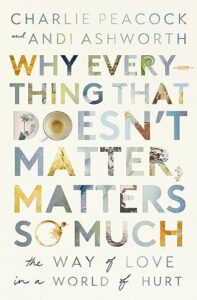 Why Everything That Doesn’t Matter Matters So Much: The Way of Love in a World of Hurt Charlie Peacock & Andi Ashworth (W Publishing Group) $19.99 // OUR SALE PRICE = $15.99
Why Everything That Doesn’t Matter Matters So Much: The Way of Love in a World of Hurt Charlie Peacock & Andi Ashworth (W Publishing Group) $19.99 // OUR SALE PRICE = $15.99
Speaking of books written as letters, this exceptional little volume is one of the best books of the year (without a doubt) for any number of reasons. It is written by pop star and Grammy-award winning producer Charlie and his very active partner and the wife of his youth, Andi. She are written by him, some by her, and some they penned together. Imagine having this wise, culturally savvy, wide-reading couple across the living room with you, over some good tea or coffee, and they tell stories and answer questions and offer hard-won but artfully shared advice. This is Christian wisdom for today, offered beautifully. Each letter is precious.
I hope you saw the great review we did of Charlie’s recently released memoir Roots & Rhythm and having read that thrilling work, some of the essays — I mean letters — here are even more powerful. I’ve highlighted these through-provoking pieces before and not that they cover a lot of ground. Some are for those of us baffled by contemporary politics. Some are for those wanting to deepen their discipleship by way of stewarding their creative gifts. Some are about marriage, about friendship, about daily life. There’s a good piece about writing. There’s some advice for public speakers. Several talk about the gift of hospitality and how to be more open to guests and others God brings to your life. There is one very good one about chronic illness and pain, and it is very honest and real.
These letters are said to be “a gentle dude” in the directly of God’s powerful-ordinary purpose of reach of us. We can all join Christ in His redemptive purposes (even though we sometimes feel like exiles from our culture, and, perhaps, from the church.) Even if Why Everything… is told in clear and down-to-earth voices, they are (after all) artists and writers so there is considerable pizzaz here, elegance at time as they move from being graciously charming to heartbreakingly poignant to what I might call nearly prophetic. This book is fun and serious and it deserves to be well known. It makes a great little gift and would be a fine choice for a book club. If I were giving fancy awards this year, believe me, this would get one. Hooray.
 Van Gogh Has a Broken Heart: What Art Teaches Us About the Wonder and Struggle of Being Alive Russ Ramsey (Zondervan) $29.99 // OUR SALE PRICE = $23.99
Van Gogh Has a Broken Heart: What Art Teaches Us About the Wonder and Struggle of Being Alive Russ Ramsey (Zondervan) $29.99 // OUR SALE PRICE = $23.99
After what I said on the inside cover — next to blurbs by writers more famous than I and scholars more knowledgeable — how could I not list this as one of my favorites of the year? When I reviewed it earlier I noted that this is the follow up to his very well received Rembrandt Is in the Wind which, like this one, has a chapter on each of a handful of painters, telling of their backstory, their faith (or resistance to faith) and how their work might stimulate or inform our own faith. The first was very good but I found this one even more touching. The first stood alongside a handful of other books — think of Terry Glaspey’s several great volumes — that offer a Christian reading of paintings and painters. But this one focuses on something that few of deeply explored and that is the ache and longing and sadness and pain of the artists and how that came out in their beloved artworks. The point, of course, is not just that we can understand Rembrandt’s “Simeon at the Temple” or Leonardo’s most famous masterpiece or Gustave More (and “the beautiful sad stories in a complicated world”) or the “delightful horror” of the Hudson River School, but, more, that we ourselves can learn to find solace and insight in knowing these stories and contexts. The subtitle gets it just right — great art teaches us “about the wonder and struggle of being alive.”
Any book that does that from a winsome but candid Christian perspective and is honest about the hurts many of us carry, and offers full color guidance, man, it’s a winner. And Van Gogh Has a Broken Heart is one of the very best books of this kind. It is not off-putting or complex, the chapters are wonderfully told and the stories are more than touching, they are illuminating.
For what it is worth, you may be surprised to read the incredible chapter on Norman Rockwell — don’t miss it. I like the one called ‘Through a Glass Darkly” that tells of contemporary painter and rocker Jimmy Abegg and the impressionists Edgar Degas Chapter Ten is called “Our PersonalCollections: Jeremiah’s Lament, the Works We Carry, and the words on Which we Rest.” The three informative appendices and the discussion guide are themselves nearly worth the price of the book.
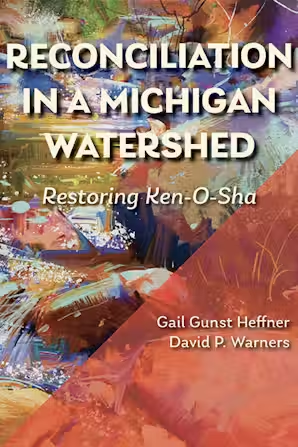 Reconciliation in a Michigan Watershed: Restoring Ken-O-Sha Gail Gunst Heffner & David P. Warners (Michigan State University Press) $29.95 // OUR SALE PRICE = $23.96
Reconciliation in a Michigan Watershed: Restoring Ken-O-Sha Gail Gunst Heffner & David P. Warners (Michigan State University Press) $29.95 // OUR SALE PRICE = $23.96
I raved about this when it first came out (admiring that one of the authors is one of the very best, life-long friends of Beth and me) and extolled it for being so very, very interesting, so very, very important. Reconciliation ecology is a branch of ecological work these days and it has to do with…. well, you have to read this thrilling book to understand one of the nuances. It is, as I said again in another review, a great book about local activism, the ups and downs of these two staff of Calvin University in Grand Rapids, Michigan, organizing both college staff and other local folk, to learn ump one of the most polluted waterways in all of Michigan.
To understand the “Plaster Creek Stewards” as the group at Calvin was called, and the multi-dimensional work of restoration the envisions, the book explores the history of the stream (and the name for it — Ken-O-Sha — given by the indigenous people there) and how it got so polluted in the first place. Naturally, settler ideologies and the history of colonialism (not to mention Dutch and Reformed theologies) come into play. Their neo-Calvinist worldviews give them tools to understand creation-care in deep ways, and this book comes full circle as they tell the story of their earliest days of service learning and social concern to becoming national known and hopeful in helping repair the harm done though this visionary movement of reconciliation ecology.
Here, here, and glasses raised to Gail and Dave, for their long years of hard work documented so tenderly (and rigorously) in Reconciliation in a Michigan Watershed and for how it might give us all a vision of caring for what Ched Myers has called “Watershed Discipleship.” It is not every day a publication of an academic / scholarly press gets on my Favorite Reads and Best Books list. This one is truly exceptional. Hooray.
 The Eighth Moon: A Memoir of Belonging and Rebellion Jennifer Kabat (Milkweed Editions) $18.00 // OUR SALE PRICE = $14.40
The Eighth Moon: A Memoir of Belonging and Rebellion Jennifer Kabat (Milkweed Editions) $18.00 // OUR SALE PRICE = $14.40
In a recent BookNotes I listed a few of my favorite memoirs read in 2024 and I did not list this one. I was still pondering what to say about it and knew it would be on this “Favorite Books of 2024” list; as soon as I posted that (full of some titles which were truly some of the most fascinating and finest writing I’ve seen in decade) I knew I should have included this stellar title.
The Eighth Moon certainly goes alongside major, stunningly-written books like 1974 (Francine Prose), Splinters (Leslie Jamison), Biting the Hand (Julia Lee), and Between Two Trailers (J. Dana Trent) and will remain a classic in my mind as a book that is so creatively written and which has left a lasting impression.
I cannot say much, here, now, but The Eighth Moon is a memoir and a history book with a dual story — the woman writer living in a small Catskill Mountain town trying to learn to love her place and what she has learned about the history of this place. Sometimes she writes about the moment and other times, sometimes in the same paragraph, she is referring to what happened on “her land” or “her road” among “her neighbors” in 1840s.
And what happened in the mid-1840s, we learn, was an uprising of Bible-quoting, Year-of-Jubilee enacting, warriors who fought back — dressed with leather masks and calico dresses — against rich people demanding rent from their oppressed tenants. Though careful (tedious) archival work (studying the florid handwriting of old deeds and court documents) she unfolds how grandchildren of the American Revolutionaries became oppressors and those who revolted in what history calls the Anti-Rent Wars.
Jennifer Kabat is a captivating and attentive nature writer and the classy, literary Milkweed Editions is a perfect, classy publisher for her. (They made famous the indigenous writer Robin Wall Kimmerer for her glorious and important Braiding Sweetgrass.) Alongside the extended pieces about waterfalls and flora and fauna and her appreciation of the sunlight on rural sheds or stone walls are commonplace stories about drinking with friends and joining up with the local volunteer fire fights. She’s a left-leaning populist (her father worked as an organizer for co-ops) and cannot understand how to relate to her Trump-supporting neighbors. The journey of her husband and herself making their way as citizens of this upstate New York region is itself splendid reading and brought tears to my eyes as I recognized so much about small towns and rural places I know.
And yet, the real power of The Eighteen Moon is the uncovering of American idealism that popped up before the Civil War, often socialistic, often idealistic, often faith-based, but weird. The Anti-Rent wars that played out in her town — her neighbors are literally descendants of those killed or arrested — are part of a larger anti-capitalist history and her zeal for this is fascinating. This is a colorful, creative, artful book that at once brings pleasure and provokes. One of the most striking and haunting books I’ve read all year.
 Even After Everything: The Spiritual Practice of Knowing the Risks and Loving Anyway Stephanie Duncan Smith (Convergent) $26.00 // OUR SALE PRICE = $20.80
Even After Everything: The Spiritual Practice of Knowing the Risks and Loving Anyway Stephanie Duncan Smith (Convergent) $26.00 // OUR SALE PRICE = $20.80
When I first described this I trust that I explained it with enough vigor and enthusiasm to show that I was a very big booster of this remarkable writer. The advance praise was great (J.S. Park called it “a soaring memoir” and Shauna Niequist exclaims, “Oh, I love this book.”) Only a few pages in and I knew.
It is a memoir, yes, and it is about the grief of losing a baby in miscarriage, yes, but it is more the narrating of one’s life in light of the liturgical calendar. I have not read a book that so nicely weaves the story of one’s own life and sorrows with the discover of the church year. From the cycles of creation to the forms of the church seasons, Even After Everything brings a beautiful story, beautifully told.
As Kayla Craig (author of Every Season Sacred) puts it, this “expansive offering” is both personal narrative and sacred story.” It’s a great read, unforgettable, even. One of the best-told stories and finest books of 2024. (See a list of other favorite memoirs, HERE.)
 Sacredness of Secular Work: 4 Ways Your Job Matters for Eternity (Even When Your Not Sharing the Gospel) Jordan Raynor (Waterbrook) $25.00 // OUR SALE PRICE = $20.00
Sacredness of Secular Work: 4 Ways Your Job Matters for Eternity (Even When Your Not Sharing the Gospel) Jordan Raynor (Waterbrook) $25.00 // OUR SALE PRICE = $20.00
As you may know, we have long been passionate about helping ordinary Christian folks think well about faithful service in their respective careers, jobs, and occupations. We all must be attentive to the things God gives us to do, and words like vocation and calling have been central to our arrangement of our shelves here at our Christian bookstore. We’ve tried to show books about the integreation of faith and learning, the Bible and daily life, helping folks connect liturgy and life, worship and work, Sunday and Monday, so to speak.
There are many books like this and as passionate as we are and as important as they are, I almost wonder if we’ve had enough, now. After decades of very few resources now there is a glut. Last year saw some thrilling ones (three from the Denver Institute on Faith and Work, Working from the Inside Out (by Jeff Haanen), Women, Work, and Calling: Step into Your Place in God’s World (by Joanna Meyer), and Faithful Work: In the Daily Grind with God and for Others (by Ryan Tafilowski & Ross Chapman.) All deserve medals of honor.
The small hardback by Jordan Raynor first struck me as too basic — saying work matters even if you aren’t doing verbal evangelism on the job seemed nearly unnecessary, since hardly anybody really thinks that, do they?
And then the reviews starting coming in, people I know said they’ve heard folks say stuff indicating a really dualistic worldview, as if all that matters is overtly spiritual stuff, or church life, or evangelism. Just when I thought the conversation had moved on, I realized that for many, this book is simply a game-changer. A life-saving, God-honoring, Christ-centered faith-saver. I really, really enjoyed it and was impressed with his citations and research and stories. Yay.
As Randy Alcorn — whose big books on heaven and on happiness are both stellar, if a bit long — puts it:
“The Sacredness of Secular Work is personally relevant and, more important, biblically faithful. Raynor has done his homework and really gets it. I think the smile of God is on this book.”
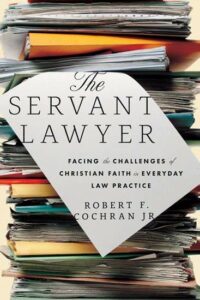 The Servant Layer: Facing the Challenges of Christian Faith in Everyday Law Practice Robert F. Cochran, Jr. (IVP Academic) $28.00 // OUR SALE PRICE = $22.40
The Servant Layer: Facing the Challenges of Christian Faith in Everyday Law Practice Robert F. Cochran, Jr. (IVP Academic) $28.00 // OUR SALE PRICE = $22.40
Speaking of thinking Christianly about one’s career and about connecting the doctrines of vocation to work, every career should be so fortunate as to have a book as spectacularly good as this. I have written about this before and, in fact, have an endorsing blurb on the inside (which sort of strikes me as funny, since I surely could never pass the Bar Exams or be organized enough to do the work of an attorney.) There are other books that focus on jurisprudence and a theoretic framework for thinking about the practice of law. Cochran and I agree that the fabulous Redeeming Law: Christian Calling and the Legal Profession by the very astute and super fun Mike Schutt (not to mention the slim but helpful The Lawyer’s Calling by Joseph Alligretti) are both must-reads and exceptionally important. But, for ordinary lawyers, thoughtful women and men who serve in fairly ordinary jobs in small-town tax law or ordinary real-estate law or who work in a fairly typical general practice there needed to be a better guidebook for them to think well and develop attitudes and postures and practices of being an attorney of integrity. Plumbing the Biblical themes of servanthood and applying them to professional legal practice makes this book one-of-a-kind.
Cochran has written scholarly books on constitutional law and the history of the field. He has done excellent work in symposia nurturing a Biblical sensibility among his fellow attorneys. He hangs with everybody from scholars like John Witte (at Emory) or James Davison Hunter at University of Virginia to his upbeat pal, Bob Goff, at Pepperdine. Cochran has traveled the world working for religious freedom and serving the poor. But has John INazu says in his lovely foreword:
It turns out that most of the work of maintaining trust and fidelity in law comes from the habits, routines, and dispositions of everyday lawyering.
For ordinary lawyers with fairly ordinary jobs, nobody has written a book like this and it is certainly, therefore, one of the most important books of the decade. Now, if only we had ones like this — rooted in good scholarship and theologically informed, but written for everyday practitioners — for doctors, engineers, farmers, or tech workers. Thanks to IVP and Bob Cochran for this one.
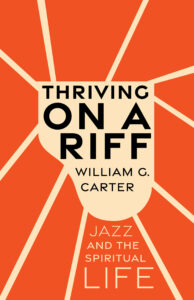 Thriving on a Riff: Jazz and the Spiritual Life William C. Carter (Broadleaf Books) $26.99 // OUR SALE PRICE = $21.59
Thriving on a Riff: Jazz and the Spiritual Life William C. Carter (Broadleaf Books) $26.99 // OUR SALE PRICE = $21.59
I have a handful of books about popular culture and music that I adore. Music matters a lot to me — see, just for instance, the memoir I raved about last time by the fascinating artist and producer Charlie Peacock (Roots & Rhythms.) We have several books on jazz, including good books written from a solid faith perspective — I often mention Bill Edgar and his fabulous 2022 IVP book, A Supreme Love: The Music of Jazz and the Hope of the Gospel. But 2024 was a great year for this topic because the long-awaited book by Presbyterian preacher and jazz pianist and leader of the hot (or is it cool) Presbybop Quartet, Bill Carter, finally came out. He has been playing piano since he was kid, immersing himself in the jazz scene for decades, and playing clubs and churches, jazz shows and jazz vespers, for a very long time. He’s lectured and written and preached about it fabulously for almost as long.
As a preacher and jazzman, he didn’t have a lot of time to fit in the writing process. And he had some woodshedding to do — he has written other books, but this; this needed to be crafted with the right balanced of story and theology, faith and history, justice and lament, jazz anecdotes and musical magic. He nailed it, I’d say, offering a great survey of the history of jazz from a broadly Christian imagination and, as the book promises, how listening or playing (or reading about) jazz can shape ones human spirituality.
From the very openness improvisation demands to the heart-felt longings of the minor keys, from blues to praise, jazz really does point us to God and to robust, creative discipleship. As church organist, theologian (and father of one of the Indigo Girls) Don Saliers puts it, “This book is no less than a love song to the art and genius of improvisation.” Saliers continues,
“Thriving on a Riff is also a musical primer about transcendence and the risks of biblical faith… If you love jazz and seek a deep sense of what is spiritual, this is a feast.”
 Plundered: The Tangled Roots of Racial and Environmental Injustice David W. Swanson (IVP) $18.00 // OUR SALE PRICE = $14.40
Plundered: The Tangled Roots of Racial and Environmental Injustice David W. Swanson (IVP) $18.00 // OUR SALE PRICE = $14.40
I invite you to go back to our BookNote archives and read what I wrote about this splendid, urgent, book. I said there and still maintain that there is nothing like this on the market and, as such, is simply a must-read. Nobody has, from a readable Christian perspective, drawn such a vivid and compelling portrait of the injustices of environmental racism and what ordinary Christians might do to resist this double-whammy of harm.
The author is a white pastor of a multi-ethnic, urban church on the South Side of Chicago who has written well about how mostly white churches might need to grow and learn about racial injustice. (See his excellent Redisicipling the White Church that came out in early 2020.) In the beginning of this recent book he tells us that he was an outdoor minded guy all along, majored in wilderness education, and figured he’s take up a career as a park ranger or wilderness guide or adventure educator. Little did he know that God would call him, of all outdoorsy people, to become a pastor and serve a very urban church.
Which situates him quite well to understand the relationship between city dwellers and pollution, toxic waste dumbs and the marginalized communities that often are polluted unfairly by them, and how issues of race come up, over and again, in matters of environmental destruction. That two of our most intractable, urgent problems — systemic racism and pollution — intermingle is (or ought to be) well know. What to do about it is of great concern.
How can the church, especially the thoughtfully evangelical sing, do something about these mutual problems? Racial and ecological injustices are, Swanson shows, symptoms of a deeper more pervasive problem and he shows us how to rethink and live anew in ways that can move us towards the reconciliation of all things promised in Scriptures.
Great writers and leaders like Randy Woodley and Brenda Salter McNeil and Ben Lowe have raved about this (alongside organizational support from folks in the CCDA and Missio Alliance, say) and we add our names (again) to the list of those insisting that this is a very, very needed and happily beautifully written book. Hooray.
 The New Testament in Color: A Multiethnic Bible Commentary edited by Esau McCaulley, Janette H. Ok, Osvaldo Padilla, & Amy Peeler (IVP Academic) $60.00// OUR SALE PRICE = $48.00
The New Testament in Color: A Multiethnic Bible Commentary edited by Esau McCaulley, Janette H. Ok, Osvaldo Padilla, & Amy Peeler (IVP Academic) $60.00// OUR SALE PRICE = $48.00
One of the things I highlighted in my essay about this in a previous BookNotes is that there is hardly anything like it in print. It is often said that books make a major contribution but this truly, truly does. There are other Biblical studies texts done by African American scholars, and some important ones that are what we might call critical and progressive. We’ve got a lot. However there is no such New Testament resource, big and thorough, done by evangelicals, bringing the insights of a range of multi-ethnic scholarship to the interpretive process. These editors have pulled together a very impressive team to create a very, very impressive volume.
Let’s just face it: scholars of color who are trained to think in terms of culturally-informed hermeneutics, and who want to write for the broader body of Christ to help us all get the Bible right, to understand it properly are — thanks be to God — a Godsend, a great gift. This book deserves kudos and should be in every church library in America. Whether you favor strictly traditional processes of Bible learning or are on the broader edge of ecumenical scholarship, this will be of value to you. We can’t say enough about it and are delighted to name it as one of the great books of 2024.
Listen to what Ninjay Gupta writes:
In my own theological education, I was pressured to suppress my ethnic perspective and experiences, to conform to some sort of disembodied neutrality. Since then I have come to learn that my background, culture, and reading lens can actually enhance my ability to understand Scripture. I am thrilled to recommend The New Testament in Color because this ‘library-in-a-book’ reflects the beautiful mosaic of a many-colored hermeneutic. I wish someone had handed this book to me twenty-five years ago, and I hope many will read it now.
Here is an excellent overview of what makes this both reliable and necessary; Max Less says it well:
The editors have done a superb job of gathering scholars from diverse ethnic backgrounds who interpret the biblical text adeptly using the familiar critical tools of exegesis, and who also demonstrate how reading from their particular social location provides theological insight germane to all of God’s people. They show how the New Testament addresses a range of issues important to today’s readers, including topics of restorative justice, immigration and hospitality, racial bias and violence, the priority of families and ecclesial communities, and so much more. Not to be missed are the excellent introductory essays, which trace the ethnic histories of peoples of color and their practice of reading the Bible with a hermeneutic of trust. Exegetically precise, theologically orthodox, and prophetically challenging, this book — in a word –preaches!” — Max J. Lee, Paul W. Brandel Professor of biblical studies at North Park Seminary
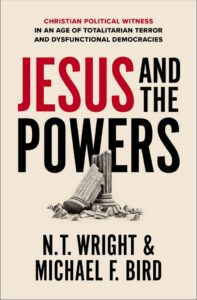 Jesus and the Powers: Christian Political Witness in an Age of Totalitarian Terror and Dysfunctional Democracies N. T. Wright & Michael Bird (Zondervan) $22.99 // OUR SALE PRICE = $18.39
Jesus and the Powers: Christian Political Witness in an Age of Totalitarian Terror and Dysfunctional Democracies N. T. Wright & Michael Bird (Zondervan) $22.99 // OUR SALE PRICE = $18.39
If the above listed title — Plundered — illustrates anything it is that many of our most pressing problems are institutional and structural and systemic. That is, being a better individual Christian or doing kindly gestures of charity will not be adequate to reform the very architecture of our social structures. That the Old Testament law addressed things like debt forgiveness and the Hebrew prophets denounced things like unfair interest rates and land speculation further illustrated the complex social nature of injustice in our world and the call to be aware of how the world really works, in it’s beauty and complicated brokenness.
That somehow some of our social systems are deeply distorted and may even have been taken over by fallen (demonic?) powers is something that Bible suggests at times, and says outright on occasion. In Colossians 2:15 Jesus is said to have defeated or disarmed “the powers” and put them to shame. In Colossians 1 it says Christ is reconciling the powers. We are reminded in Ephesians 6:12 that we don’t fight against ordinary flesh and blood but against spiritual powers in high places. That is, Christ seems not to have fully reconciled those destructive institutional structures quite yet.
Few contemporary writers have explored this, although one who did was Walter Wink in his important three or four volume set. About the turn of the century our old friend Marva Dawn did a tremendous set of lectures at Pittsburgh Theological Seminary which explored and reformed Wink a bit that was developed into a book called Powers, Weakness and the Tabernacling of God. Both drew on the Dutch Hendrikus Berkof, a little volume translated by John Howard Yoder in the 1970s. Nobody since Marva has done much on this topic.
Enter Wright and Bird — a Brit and an Aussie — who have finally given us the thoughtful (but fully readable) volume on the subject we have long needed. Yes, they explore a bit some of the authoritarian political movements developing around the world, from Hungary to Venezuela to the USA. And, yes, of course, they are greatly concerned about the obvious dangers in the extremisms of the nationalist movements. But their socio-political insights are always shaped by how people following Christ must be “building for the Kingdom.” It is a Biblical study of the question about the Kingdom of God as it relates to the social and political upheavals of our day.
Wright has several collections of essays (which we import from the UK) about the principalities and powers, about social witness, about cultural relevance and the reformation of society. But this is his first major work done like this — “part political theology, part Biblical overview, part church history.” If Christ’s Kingdom confronts the empires of this world how do we engage with that? What does it look like as we orient ourselves to Christ’s ways? Is there an approach to current events that is shaped by Christ’s Kingdom? One of the best books of 2024!
At a time when discussions about Christian nationalism and debates over religion and politics too often involve more heat than light, Jesus and the Powers offers something different. Drawing on their expertise in biblical theology and on two millennia of global Christian history, Tom Wright and Mike Bird present a defense of liberal democracy that pushes back against the extremes of the Left and the Right. There are no easy answers here, but readers across religious and political spectrums will find much to grapple with in this sharply written text, and perhaps also a framework for the pursuit of mutual human flourishing in a polarized age. — Kristin Kobes DuMez, Jesus and John Wayne: How White Evangelicals Corrupted a Faith and Fractured a Nation
In our unsettled and polarized world, it is as easy to be tempted by the solutions offered by those on the extremes as it is to put our heads in the sand. Bird and Wright remind Christians that Jesus truly is king and the hope of the world, and they encourage us toward steady faithfulness when it is easy to be swept away by the shifting winds of historical and political circumstance. Read this book, remember ‘the old story’ and pursue public faithfulness while resting in truth. — Vincent Bacote, author of The Political Disciple: A Theology of Public Life
Jesus inaugurated his ministry by proclaiming the coming of the kingdom of God. What does that long-ago event have to do with us today? Everything, say the authors of Jesus and the Powers. The fundamental character of authentic Christian political activity, they argue, is ‘building for the kingdom.’ Using their skills as esteemed New Testament scholars, the authors first illuminate what Jesus would have meant by ‘the kingdom of God’ and then explore how present-day Christians can build for the kingdom. I know of no other book that comes even close to locating, so insightfully and in such rich detail, Christian political activity within the context of the coming of the kingdom. Given what is happening in politics today, their call for Christians to engage as workers for the kingdom could not be timelier. — Nicholas Wolterstorff, Until Justice and Peace Embrace
 Faithful Politics: Ten Approaches to Christian Citizenship and Why It Matters Miranda Zapor Cruz (IVP Academic) $24.00 // OUR SALE PRICE = $19.20
Faithful Politics: Ten Approaches to Christian Citizenship and Why It Matters Miranda Zapor Cruz (IVP Academic) $24.00 // OUR SALE PRICE = $19.20
I have written a lot about faith and politics this past year (and did a multi-week course this fall at my PC(USA) church that one can find on Facebook and YouTube, actually. I could wax eloquent about a dozen good books, old and new. (Brand new, by the way, is the long-awaited Citizenship Without Illusions: A Christian Guide to Political Engagement by the impeccably thoughtful and almost too moderate David Koyzis.) Please see HERE and HERE or, a bit older, HERE for a few good lists. We need them now more than ever, I’d say.
This one if my vote for best new book about Christian political witness overall. It highlights ten historic and current approaches, postures and styles that have various emphasis or insight, and she offers the Biblical basis for and the social impact of each tradition. In some chapters she breaks it down even more — in the chapter “Keeping the Kingdom out of the Country’ she dissects three “Separatist” Approaches and in “Keeping the Country Out of the Kingdom” she explores two other “Separationist” Approaches (noting the slight differences in spelling, there.) In, for instance “Keeping the Country Under the Kingdom” she describes two different Calvinist approaches. As she calls us all to “salty citizenship” we recognizes that there are many different voices out there, from what historians call “social gospel” approaches and to these varying nuances of ways to related Kingdom and country. It’s all very, very interesting and very, very wise.
The last two chapters, she insists, are models that are not (like the above ones) viable. They are unfaithful and troublesome, but important so she critiques what some call dominionist approaches and what is known as Christian nationalism.
Jo Anne Lynn (general superintendent emerita of The Wesleyan Church) says it is “the most comprehensive understanding of the role of the Christian believer in national politics from a biblical, theological, and historical perspective to date.”
Chan Woong Shin of Gordon College asks if we really need yet another book on Christianity and politics.. He answers his question saying, “after reading Dr. Cruz’s Faithful Politics, my answer is a resounding yes!”
Dr. Cruz teaches historical theology at Indiana Wesleyan University. She holds a PhD in religion politics, and society from Baylor University and an MDiv from Princeton Seminary.
 The Age of Grievance Frank Bruni (Avid Readers Press) $28.99 // OUR SALE PRICE = $23.19
The Age of Grievance Frank Bruni (Avid Readers Press) $28.99 // OUR SALE PRICE = $23.19
I adored this book, full of care and anguish and wisdom and moderation, even as he skewers Trumpian outbursts and exposes the pseudo-grievances that plague so many. These grievances are growing and (as one rave review puts it) the book offers “an astonishing, alarming catalog” but he gets to the solutions which are “smart and hopeful.” Each political tribe these days seems to be “out victiming” the other. This explores this feature of contemporary culture and why it is so harmful for our body politic.
In the last year or two I have read maybe 15 books on the rise of the extremist far right, from edge-of-your-seat memoirs of guys who infiltrated the KKK or neo-Nazi groups to studies of the wild shenanigans of those who in recent decades took over the Republican Party. I’ve recommended many of these thinking that it is really, really important stuff (and there are a lot to wade through.) Honorable mentions include The Deconstructionists: The Twenty-five Year Crack-Up of the Republican Party by Dana Milbank and When he Clock Broke: ConMen, Conspiracists, and How America Cracked up in the Early 1990s by John Ganz. These are must-reads, in my view.
I didn’t mention the creepy and vulgar Black Pill: How I Witnessed the Darkest Corners of the Internet Come to Life, Poison Society, and Capture American Politics by the brave Elle Reeve. It has been called “a surreal feat of investigative journalism” showing how seemingly weird- online groups sometimes spill out into political violence. Brian Stelter said it is “powerful and propulsive” and that it is. He explains that she “fearlessly investigates some of the most insidious corners of the internet and showcases, to horrifying effect, how these radical pockets are threatening the rest of us.”
Bit with all this analysis of the dangers of the far right (which, as I have written before, I think are much more vivid and concerning that dangers of the left, these days) it was Frank Bruni who helped me maintain balance and explore this not quite below the surface impulse about grievance-bearing. It was one of my favorite reads this year.
Jonathan Haidt (himself no liberal of course) notes that,
It can be a pleasure to read about how terrible things are when the writer is Frank Bruni. He gives us a catalogue of absurdities, sparing neither left nor right, along with some explanations of why our current wave of grievance is more dangerous than earlier waves. He also gives us great ideas for making our country less absurd. This is a wise and humane book for our foolish and cruel era. — Jonathan Haidt, author of The Anxious Generation and The Righteous Mind
 They Flew: A History of the Impossible Carols Eire (Yale University Press) $35.00 // OUR SALE PRICE = $28.00
They Flew: A History of the Impossible Carols Eire (Yale University Press) $35.00 // OUR SALE PRICE = $28.00
This came out at the end of 2023, I’ll admit, but I didn’t pick it up until 2024 and I worked on it, on and off, throughout the year. I want to say it was my pick for the best academic book, from a scholarly press, that I read all year. (The aforementioned Reconciliation in a Michigan Watershed, while on a peer-reviewed, scholarly press, is so very readable that I hardly want to pitch that as an academic title.) This, though, is tedious (in all the right ways.) It is careful scholarship, exploring the ways in which the miraculous was observed at the cusp of the modern world in late medieval Europe. That would be intersting enough, this class of worldviews, this study of miracle and proof and logic and science but there is more, a lot of a very specific more. It is about levitation. And bi-location. Oh my…
You may have skimmed over those parts in Interior Castle or not allowed these stores to grab you in other well-known works of the mystical life. I recall that bit in one of the volumes of the Philokalia, but figured it was rare and eccentric. I know I never took seriously —I hardly noticed, or it never registered — the many paintings of the levitations of St Francis, Thomas Aquinas, Teresa of Avila, and St. John of the Cross and more. What was God doing with this rash of miraculous levitations? What is the definition of impossible? What cultural contexts, if any, give rise to such inexplicable things? How did the church respond?
That answer, with some nuances, can be simplified by saying these things were considered either as miraculous (a gift from God) or somehow fraudulent (which was difficult to prove since there were so many eye witnesses) or very real, but demonic. (The Protestant Reformers of the mid 1500s generally thought of these reports as demonic activity.)
Eire won the National Book Award years ago for his much-loved Waiting for Snow in Havana and has been a professor of History and Religious Studies at Yale University for year. His colleague (and Calvin biographer) Bruce Gordon says, “Only Carols Eire could take us on this job rent to the impossible.” He calls it a “brilliant feat of scholarship and imagination.” This really could change our attitudes about the early modern world, and I think it was one of the most amazing books I’ve read this past year.
 Get the Picture: A Mind-Bending Journey Among the Inspired Artists and Obsessive Art Fiends Who Taught Me How to See Bianca Booker (Viking) $29.00 // OUR SALE PRICE = $23.20
Get the Picture: A Mind-Bending Journey Among the Inspired Artists and Obsessive Art Fiends Who Taught Me How to See Bianca Booker (Viking) $29.00 // OUR SALE PRICE = $23.20
Holy smokes, what a blast this big book was. I can’t say enough about it (and can’t wait to dive into her older one, the quirky, if similar in approach, Cork Dork: A Wine-Fueled Adventure Among the Obsessive Sommeliers, Big Bottle Hunters, and Rogue Scientists Who Taught Me to Live.) Get the Picture is both an introduction to the contemporary modern art scene (mostly in New York City) and a bit of a guide to how to understand and interpret modern art. And it is rip-roaring good, caring, funny, honest, well written without being so lavishly done that one gets lost. It is a great read, upbeat and aggravating and inspiring.
Here’s the deal. Bosker, a journalist for The Atlantic, et al, admits she’s the kind of person who wants to like modern art, or contemporary art installations, but has this sneaky feeling “any five- year-old could have done that.” The near pornographic scenes and the arcana deconstructionist lingo leave her cold or clueless. Of course she knows your not supposed to think that, let alone say it out loud, so she studies paintings and sculptures in galleries and museums, and goes to shows and looks and looks and waits for the inspiration to hit. The slanted brilliance and upsetting insight of it all — she learned that “beauty” is not what the contemporary art scenesters are going for — just never hits her. She decides she has to work in the scene, volunteering at a gallery, working with artists, learning about art school and interpretation and performance art and gallerists and, well, nobody trusts her. This is a very elite network (the word “rarefied” comes to mind) and, often, dangerously rude. She is seen, irony of irony for the postmoderns who want to give voice to the marginalized and be inclusive, as “the enemy.”
Get the Picture is, indeed, “the mind-bending journey” of her coming to know these obsessives and even though it almost kills her, she comes to “see” at last. In a manner of speaking. It is really a great, fun read and you will learn a lot. One critic called it “sheer pleasure” and “the best book I’ve ever read about contemporary art.” It also investigates with an open heart, in the words of Patricia Marx, “the questions you are too chicken to ask: ‘Um, how come this is called art and now come I’m supposed to like it?’” It’s a great, great read.
 Break, Blow, Burn, & Make: A Writer’s Thoughts on Creation E. Lily Yu (Worthy) $27.00 // OUR SALE PRICE = $21.60
Break, Blow, Burn, & Make: A Writer’s Thoughts on Creation E. Lily Yu (Worthy) $27.00 // OUR SALE PRICE = $21.60
You may know of Lily Yu’s fine writing — she has done novels and short stories — and rejoice that she is esteemed in the high-brow world of contemporary fiction. This series, thoughtful, profound work is on a publisher that is know for many evangelical authors and I was surprised at first. And then I was very glad, realizing she is a serious thinker about faith and the arts, and is informed by everyone from Jaques Maritan to Madeline L’Engle to the aesthetics of George MacDonald. She cites folks as diverse as James Baldwin to Pierre Teilhard de Chardin to G.K. Chesterton. She is a fine reader and a very fine writer.
I noticed she does not quote my favorite Calvin Seerveld, but I suppose that would be asking a bit much. She does cite N.T. Wright and Mako Fujimura, which is almost as good. She does explore her topic of writing in God’s world, the notion of making, of creating, and (as Karen Russell puts it) has given us “a love letter to God and to language, to writers and readers…” It really is a love letter to us all. As Mako writes, “Yu deftly weaves together beekeeping, catching trout, Rilke, Milosz, and Christ, sometimes in a single breath, and her words illumine like a candle in a neglected church.”
We have a good number of such books and we would quickly recommend any number. This, though, is rich and moving and extraordinarily thoughtful.
To read Break, Blow, Burn, & Make is to behold — to gaze upon the beauty of the fragments and broken remains of our art and our lives, to be gifted the courage to be faithful makers. It is an invitation to hope, to persevere, to recalibrate through despair, to pray and ultimately to love. At times in reading this gem filled book, I wanted to pause and weep, and at other times I wanted to stand up and applaud…. I follow her into that sacred, darkened space, and sojourn into our daily discipline of making there.– Makoto Fujimura, author of Art+Faith: A Theology of Making
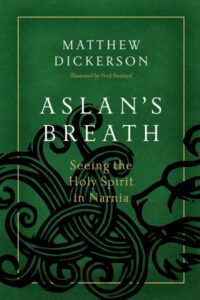 Aslan’s Breath: Seeing the Holy Spirit in Narnia Matthew Dickerson (Square Halo Books) $19.99 // OUR SALE PRICE = $15.99
Aslan’s Breath: Seeing the Holy Spirit in Narnia Matthew Dickerson (Square Halo Books) $19.99 // OUR SALE PRICE = $15.99
I highlighted this a time or two in these BookNotes columns this past year and I now want to insist it is one of the Best Books of 2024. I say this for a few reasons; most simply, because it is.
But, also, it is a winner because it is relatively short, but with lots of fresh material; well-written without being dense or audacious; thoughtful without being arcane; lively without being silly or flamboyant. It’s a great read and — get this, with a drum roll please: there is nothing like it in print. I don’t get to say that often but every year or so I find a book that truly nobody else has tackled. Aslan’s Breath is a study, just as the subtitle promises, of how the images of the Holy Spirit show up in the Chronicles of Narnia.
As I have said before, each chapter explores how a certain book in Narnia describes the Spirit For the metaphors and symbols of the Spirit that Lewis uses in that book. For instance, in The Lion, The Witch and the Wardrobe the Spirit is seen as “transforming power” (says Dickerson, and he shows it.) In Prince Caspian the Spirit is found in the language of “growing bigger.” Naturally, in The Magician’s Nephew the Holy Spirit is “breath and wind at creation.”
You will find some blended symbols and plenty of courage. You will find gentleness and comfort (especially in a very moving passage from The Horse and His Boy.) This will intrigue anyone who loves Narnia and would be a great book to read together.
There are great lithographs by the book’s editor, printmaker and author Ned Bustard (perhaps most known for his design work and illustrations in the three Every Moment Holy volumes and several other Square Halo titles.) Together, Ned and Matthew have given us a lovely little book, one we are honored to declare one of the truly fresh books of 2024.
 Through Middle Eastern Eyes: A Life of Kenneth E. Bailey Michael Parker (Wipf & Stock) $29.99 // OUR SALE PRICE = $23.99
Through Middle Eastern Eyes: A Life of Kenneth E. Bailey Michael Parker (Wipf & Stock) $29.99 // OUR SALE PRICE = $23.99
I think it could be said that many of us who knew Ken Bailey — not to mention the tens and tens of thousands all over the world who esteemed his great books of Biblical scholarship (especially New Testament studies) — have longed for a book about him. Surely the story of this Western Pennsylvania Presbyterian who ended up teaching in Beirut during the civil war there (1975-1990) and in Cairo and other Middle Eastern cities needed his story to be told. Ken was not only a fiercely ecumenical evangelical and a best selling author in the world of Biblical teaching but was known throughout the world as a scholar of early Middle Eastern Christian literature; he owned one of the very few extant copies of a rare early centuries set of book (I rarely understood what he was referring to when he talked to me about Coptic Christian commentaries and Syrian linguistics and Arabic manuscripts and such. Although he lectured at Oxford and Cambridge, he was at home in Middle East. That one of his major collections of eases is called Jesus Through Middle Eastern Eyes tells you much about his primary contribution.
Scholars the world over admired him. Ken told me once on the phone, as he was writing Jacob and the Prodigal (an ingenious study of the literary parallels between Jesus’s “Prodigal Son” story and the epochal story of Jacob in Genesis) that after a while he thought maybe he was “seeing things” that weren’t really there. He already had a list of over 50 seemingly deliberate parallels. He said he send the work-in-progress to N.T. Wright to see if Tom might talk him out of this fanciful stuff. Of course Wright was astounded, assuring him this was good stuff, and to carry on. His insights about the ancient far East and the contemporary Middle East — including “the simple villages of upper Egypt” — shaped all that he did.
Chapters in this biography have clever titles that speak to this cultural setting: “The Antiochian Missionary” and “On the Island of Aphrodite” and “O Jerusalem, Jerusalem.”
There is plenty here about the travels and ministry of Ken and Mickey and their family. It describes the research done for most of his books (and the Hollywood-inspired movie he made, retelling the story of the Prodigal Son, in Arabic, with mostly professional Muslim actors.) There is the moving section part way through, about his son, David, a popular singer-songwriter and performer who bravely faced cancer and died in October of 2010. And, of course (for those who known Presbyterian mission stuff) there is a bit about his beloved New Wilmington Missionary Conference.
Author Michael Parker served as a missionary and professor of church history for many years in Sudan, Rwanda, and Egypt. From 2012 to 2020 he was the director of graduate studies at the Evangelical Theological Seminary in Cairo, Egypt. His dedicated work on this project is to be celebrated. Many are very, very grateful.
This is the remarkable story of a life we can only imagine. Michael Parker’s expert telling of Bailey’s life is enthralling and pulls us back to another era of courageous scholar-missionaries that today are few. Bailey was a missionary to the Arab world, but more, he was a missionary to the West, helping us see our Scriptures through the eyes of a world that originally produced them. — Gary Burge, professor emeritus of New Testament, Wheaton College, co-author of The New Testament in Antiquity: A Survey of the New Testament Within Its Cultural Contexts and Whose Land? Whose Promise? What Christians Are Not Being Told about Israel and the Palestinians
 Living in Wonder: Finding Mystery and Meaning in a Secular Age Rod Dreher (Zondervan Reflective) $29.99 // OUR SALE PRICE = $23.99
Living in Wonder: Finding Mystery and Meaning in a Secular Age Rod Dreher (Zondervan Reflective) $29.99 // OUR SALE PRICE = $23.99
I highlighted this in a previous BookNotes and always new I’d say it was one of the most important Christian books of 2024. I am so glad to have read it and so glad a few customers picked it up. I have some resistance to it for a number of reasons but there is no doubt that it was one of the most striking books I’ve read this year. Maybe you too, eh?
Here is the gist: Rod Dreher is a culturally edgy and very widely read, socially conservative, Orthodox Christian. He wrote a thrilling memoir about the death of his sister, and another about how reading Dante helped, literally, save his life. He has been outspoken against the progressive drift of secularized culture and has been a bit controversial in all of that. I enjoy him; he is a good writer, and I either loved or hated his recent books. This one is yet another leg on his journey and it is both delightfully personal with well told stories and deeply aware of and articulate about the roots of Western modernity, the secularizing forces of our contemporary age, and the thrilling sense of wonder that can still be encountered if one has the eyes for it.
Yes, this book includes some fascinating stuff about UFOs and other mysteries about the weirdness of modern life. It wonders how realizing that the world is more wondrous that most know or appreciate right transform our lives. He tells some powerful stories of extraordinary spiritual encounters that he has never told and he invites us to be more deeply aware of the supernatural world.
He gets at all the spiritual stuff not by way of American evangelicalism, let alone Pentecostal or charismatic renewal, although it sounds a bit like that at times. I say bring it on. If a cultural critique and writer about “the secular age” can invite us to his Orthodox practices (icons, the Jesus Prayer, the complexity of ancient liturgy, not to mention the beauty of good literature and such) and get us thinking more broadly about the dehumanization of a stripped down and reductionist world, and offers a bigger account of the really real, then I’m all in.
Living in Wonder is a brave book that will captivate you, even if your are a skeptic. It will touch you even if you are a cynic. It might, as novelist Paul Kingsnorth puts it, “point the way out of the delusions of our modern dream and back toward reality.’ One critic said it is both “disturbing and visionary.” Yep. It is one of the great reads of 2014 and a very important book.
 Backroads and Better Angels: A Journey into the Heart of American Democracy Francis S. Barry (Steer Forth Press) $35.00 / OUR SALE PRICE = $28.00
Backroads and Better Angels: A Journey into the Heart of American Democracy Francis S. Barry (Steer Forth Press) $35.00 / OUR SALE PRICE = $28.00
This big, fat, fabulous book came out in 2023 but I didn’t discover it until 2024; a person in my church was this author’s camp counselor years ago and stayed in touch. I somehow missed that he visited our church learning about the history of racism and racial reconciliation in York, PA, several years before and his encounter is in this, his big, fat, fabulous book. That I read in 2024.
I could lecture on this (and have read from it in classes and workshops I’ve done) but the short version is simply this: Barry and his wife get an RV and almost comically, with very good hearts and very good eyes (although not always so good navigation) set out to drive the entire length of the legendary Route 30. Hence the visits to Philly, Lancaster, York, Gettysburg, Chambersburg and off into Pittsburgh early in the book. You know we live right near that Lincoln Highway, even if Amor Towles does not mention us.
Not only is this a fun travelogue across America, it does three extraordinary things and does them delightfully. First Barry reports about the local stuff he sees and learns. He’s a local history buff and so in each town you learn, as he does, interesting (dare I say important) stories, things that matter. He is a politico — a Democrat speechwriter for Mayor turned candidate Bloomberg — and he cares about civic life, the common good, the human scale of politics and the history of folks working together. Not only do we learn a whole bunch of historical things along the way of this huge journey, Secondly, Barry is constantly asking people what holds America together. Can we get along? The polarization wasn’t even as bad a few years ago as it is now, but, even then, the trip was a brave journey to ask about our better angels. It is an important document about our cultural moment, I think.
Thirdly, that “better angels” line, of course, is from Lincoln, and from the Lincoln Tunnel on out across this land, our driver / author keeps Lincoln stories front and center. Who knew? Who knew, I want to shout! Even if you are well informed about the great, tall President, you will learn things I am sure. And you will be better for it. And it will be a blast since all this learning happens through conversation, day by day, as Francis and his wife drive their way across America in this goofy big rig. I loved this book. God bless them.
TWO BOOKS THAT I JUST HAD A BLAST WITH, FUN READING WITH A SLIGHT MORAL TO THE STORY…
 Rocky Mountain High: A Tale of Boom and Bust in the New Wild West Finn Murphy (Norton) $17.99 // OUR SALE PRICE = $14.39
Rocky Mountain High: A Tale of Boom and Bust in the New Wild West Finn Murphy (Norton) $17.99 // OUR SALE PRICE = $14.39
I told you about this in greater detail in a previous BookNotes but it is one of those books that I read because I liked the author (his book about being a long haul trucker, The Long Haul, was a heckuva thrill ride) and was intrigued by the story of a guy starting up a business. Despite the goofy title, this is not about pot, exactly, but is about growing hemp (what they called for a year or so in Boulder County Colorado, “the hemp space.”) This trucker has a great heart and a sharp mind but, frankly, knew nothing about said space, or really any agricultural space. That he could Gert a boat-load of money and hire a relative and try to grow hemp (and dry it and sell it to pharmaceutical hotshots) makes for a wild ride, wilder than his long haul trucking book. It is witty and fun and moves with a moral center, even if everything goes wrong almost from day one. It is, they say, “a masterful tael of one entrepreneur’s misadventures.” A fun read that I couldn’t put down.
I like what writer Jessica Bruder (of the powerful Nomadland) said: she said it “brims with wit and pluck and hard-won wisdom.” Yep.
 All The Worst Humans: How I Made News for Dictators, Tycoons, and Politicians Phil Elwood (Holt) $28.99 // OUR SALE PRICE = $23.19
All The Worst Humans: How I Made News for Dictators, Tycoons, and Politicians Phil Elwood (Holt) $28.99 // OUR SALE PRICE = $23.19
I ripped through this (despite the stupid cover) in almost one long sitting on quiet Sunday and I am thinking about it still, months later. It is the personal story of a guy who worked in Washington DC and eventually became known as one of the great PR guys. He got some very high-paying jobs with some very big firms who do this sort of thing and next thing you know he is baby-sitting Middle Eastern dictators in Las Vegas, flying around the country with world-famous bigwigs, crafting media strategies for some of the worst humans who grace this sad, grisly planet. How could he do such stuff, grease the wells and sell false stories about dictators and other sorts of low level (if well paying) bad guys? How could he live with himself, maven that he was?
Here’s how the New York Times described it:
This memoir by a former public relations operative for the wealthy and the corrupt is greasy fun — stocked with scoundrels, cocktails and guns, and showing off the charm and quick wit that catapulted Elwood to the top of the sleazy, amoral world of high-end spin.”
Listen to this:
If Hunter S. Thompson billed clients by the hour, it would look like All The Worst Humans by Phil Elwood. The pacing and storytelling propel the book’s epic sweep across the dark side of DC and global hotspots. Even the most experienced in PR will learn things they did not know, and Elwood’s gripping personal story is an unexpected and wild ride. — Bill McCarren, former Executive Director, National Press Club
The wild writer and bad boy Christopher Buckley says it is “hilarious and harrowing and hard to put down.” Exactly.
+++
TO PLACE AN ORDER
PLEASE READ, THEN SCROLL DOWN TO CLICK ON THE “ORDER” LINK BELOW.
It is helpful if you tell us how you want us to ship your orders. And if you are doing a pre-order, tell us if you want us to hold other books until the pre-order comes, or send some now, and others later… we’re eager to serve you in a way that you prefer. Let us know your hopes.
The weight and destination of your package varies but you can use this as a quick, general guide:
There are generally two kinds of US Mail options and, of course, UPS. If necessary, we can do overnight and other expedited methods, too. Just ask.
- United States Postal Service has an option called “Media Mail” which is cheapest but can be a little slower. For one typical book, usually, it’s $4.83; 2 lbs would be $5.58. This is the cheapest method available and sometimes is quicker than UPS, but not always.
- United States Postal Service has another, quicker option called “Priority Mail” which is $8.70, if it fits in a flat-rate envelope. Many children’s books and some Bibles are oversized so that might take the next size up which is $9.50. “Priority Mail” gets more attention than does “Media Mail” and is often just a few days to anywhere in the US.
- UPS Ground is reliable but varies by weight and distance and may take longer than USPS. Sometimes they are cheaper than Priority. We’re happy to figure out your options for you once we know what you want.
If you just want to say “cheapest” that is fine. If you are eager and don’t want the slowest method, do say so. It really helps us serve you well so let us know. Keep in mind the possibility of holiday supply chain issues and slower delivery… still, we’re excited to serve you.
BookNotes

SPECIAL
DISCOUNT
20% OFF
ALL BOOKS MENTIONED
this takes you to the secure Hearts & Minds order form page
just tell us what you want to order
if you have questions or need more information
just ask us what you want to know
Hearts & Minds 234 East Main Street Dallastown PA 17313
read@heartsandmindsbooks.com
717-246-3333
As of January 2025 we are closed for in-store browsing.
We are doing our curb-side and back yard customer service and can show any number of items to you if you call us from our back parking lot. We’ve got tables set up out back. It’s sort of fun, actually. We are eager to serve and grateful for your patience. We are very happy to help, so if you are in the area, do stop by. We love to see friends and customers.
We will keep you posted about our future plans… we are eager to reopen. Pray for us.
We are happy to ship books anywhere.
We are here 10:00 – 6:00 EST / Monday – Saturday. Closed on Sunday.
 As is often the case, we take more books than we should to author events. (In his discussion of shame it dawned on me that maybe one of the reasons we buy too many author books most times when we do gigs like this — a habit I’ve attributed to my optimism in the book buying audience — may be that I fear being embarrassed. I don’t want to be ashamed of a snafu or be seen as incompetent as a book provider if we run out. Hmm. So we end up with a lot of extras.)
As is often the case, we take more books than we should to author events. (In his discussion of shame it dawned on me that maybe one of the reasons we buy too many author books most times when we do gigs like this — a habit I’ve attributed to my optimism in the book buying audience — may be that I fear being embarrassed. I don’t want to be ashamed of a snafu or be seen as incompetent as a book provider if we run out. Hmm. So we end up with a lot of extras.) The day unfolded with four major talks by Curt which seemed somewhat to mirror his four volumes. Or at least the bookseller in me noticed that. He moved from asking the question “what story are we telling?” about ourselves (and who or what has shaped that narrative?) to questions of shame and then to re-ordered desires. (We are “wanting” creatures, he wisely noted, drawing on ancient wisdom from Scripture, channeling pre-modern notions from Augustine and post-modern ones from Jamie Smith — we are not “brains on a stick” but we “are what we love.”)
The day unfolded with four major talks by Curt which seemed somewhat to mirror his four volumes. Or at least the bookseller in me noticed that. He moved from asking the question “what story are we telling?” about ourselves (and who or what has shaped that narrative?) to questions of shame and then to re-ordered desires. (We are “wanting” creatures, he wisely noted, drawing on ancient wisdom from Scripture, channeling pre-modern notions from Augustine and post-modern ones from Jamie Smith — we are not “brains on a stick” but we “are what we love.”) And he asked some tough questions, about our own sense of hurt and shame, and what it might take to find people who can help us in the process of re-ordering our desires, finding new hope and resilience as we want the right stuff — goodness, beauty, truth, community. He invited us to Christ-like virtues as we speak truth in this complicated cultural moment.
And he asked some tough questions, about our own sense of hurt and shame, and what it might take to find people who can help us in the process of re-ordering our desires, finding new hope and resilience as we want the right stuff — goodness, beauty, truth, community. He invited us to Christ-like virtues as we speak truth in this complicated cultural moment.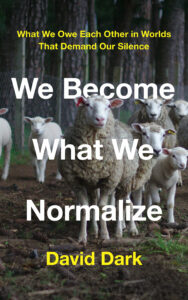 And then my friend David Dark, author of We Become What We Normalize: What We Owe Each Other in Worlds That Demand Our Silence (Broadleaf Books; $26.99 // OUR 20% OFF SALE PRICE = $21.59) asked him publicly, “Who harmed you?” Surely, if I can read into David’s question, the dangerous ideologue is hurting. What ruptures in his soul have helped shape his despicable public demeanor?
And then my friend David Dark, author of We Become What We Normalize: What We Owe Each Other in Worlds That Demand Our Silence (Broadleaf Books; $26.99 // OUR 20% OFF SALE PRICE = $21.59) asked him publicly, “Who harmed you?” Surely, if I can read into David’s question, the dangerous ideologue is hurting. What ruptures in his soul have helped shape his despicable public demeanor? ((Aside: There is a brand new book just out that invites us to do this sort of work exploring past hurts and traumas with generosity to ourselves and it will be an important resource alongside the Curt Thompson titles I’m highlighting here. We’ll hopefully soon review Make Sense of Your Story: Why Engaging Your Past with Kindness Changes Everything by Adam Young (Baker Books; $22.99 // our 20% OFF SALE PRICE = $18.39.) It has a forward by Dan Allender and travels similar ground to Thompson, even drawing on the important work of Dr. Daniel Siegel. We have it at 20% off.))
((Aside: There is a brand new book just out that invites us to do this sort of work exploring past hurts and traumas with generosity to ourselves and it will be an important resource alongside the Curt Thompson titles I’m highlighting here. We’ll hopefully soon review Make Sense of Your Story: Why Engaging Your Past with Kindness Changes Everything by Adam Young (Baker Books; $22.99 // our 20% OFF SALE PRICE = $18.39.) It has a forward by Dan Allender and travels similar ground to Thompson, even drawing on the important work of Dr. Daniel Siegel. We have it at 20% off.))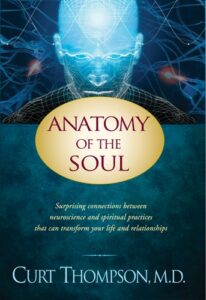 Anatomy of the Soul: Surprising Connections Between Neuroscience and Spiritual Practices That Can Transform Your Life and Relationships Curt Thompson (Tyndale) $18.99 // OUR 40% OFF SALE PRICE = $11.39
Anatomy of the Soul: Surprising Connections Between Neuroscience and Spiritual Practices That Can Transform Your Life and Relationships Curt Thompson (Tyndale) $18.99 // OUR 40% OFF SALE PRICE = $11.39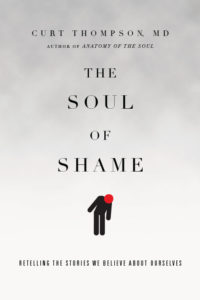 The Soul of Shame: Retelling the Stories We Believe about Ourselves Curt Thompson (IVP) $27.99 // OUR 40% OFF SALE PRICE = $16.79
The Soul of Shame: Retelling the Stories We Believe about Ourselves Curt Thompson (IVP) $27.99 // OUR 40% OFF SALE PRICE = $16.79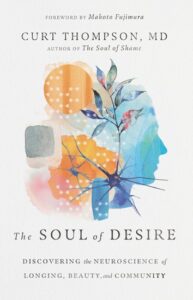 The Soul of Desire: Discovering the Neuroscience of Longing, Beauty, and Community Curt Thompson (IVP) $28.99 // OUR 40% OFF SALE PRICE = $17.39
The Soul of Desire: Discovering the Neuroscience of Longing, Beauty, and Community Curt Thompson (IVP) $28.99 // OUR 40% OFF SALE PRICE = $17.39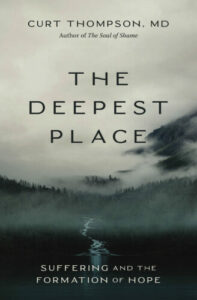 The Deepest Place: Suffering and the Formation of Hope Curt Thompson (Zondervan) $27.99 // OUR 40% OFF SALE PRICE = $16.79
The Deepest Place: Suffering and the Formation of Hope Curt Thompson (Zondervan) $27.99 // OUR 40% OFF SALE PRICE = $16.79 The Other Half of Church: Christian Community, Brain Science, and Overcoming Spiritual Stagnation Jim Wilder and Michel Hendricks (Moody Press) $15.99 // OUR 40% OFF SALE PRICE = $9.59
The Other Half of Church: Christian Community, Brain Science, and Overcoming Spiritual Stagnation Jim Wilder and Michel Hendricks (Moody Press) $15.99 // OUR 40% OFF SALE PRICE = $9.59 Wayfaring: A Christian Approach to Mental Health Care Warren Kinghorn (Eerdmans) $29.99 // OUR 40% OFF SALE PRICE = $17.99
Wayfaring: A Christian Approach to Mental Health Care Warren Kinghorn (Eerdmans) $29.99 // OUR 40% OFF SALE PRICE = $17.99 The Connected Life: The Art and Science of Relational Spirituality Todd W. Hall (IVP) $26.99 // OUR 40% OFF SALE PRICE = $16.19
The Connected Life: The Art and Science of Relational Spirituality Todd W. Hall (IVP) $26.99 // OUR 40% OFF SALE PRICE = $16.19 Relational Spirituality: A Psychological-Theological Paradigm for Transformation Todd W. Hall with M. Elizabeth Lewis Hall (IVP Academic) $40.00 // OUR 40% OFF SALE PRICE = $24.00
Relational Spirituality: A Psychological-Theological Paradigm for Transformation Todd W. Hall with M. Elizabeth Lewis Hall (IVP Academic) $40.00 // OUR 40% OFF SALE PRICE = $24.00

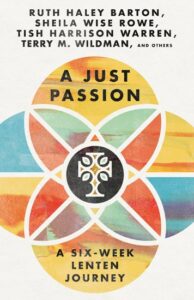 A Just Passion: A Six-Week Lenten Journey (IVP) $12.99 // OUR SALE PRICE = $10.39
A Just Passion: A Six-Week Lenten Journey (IVP) $12.99 // OUR SALE PRICE = $10.39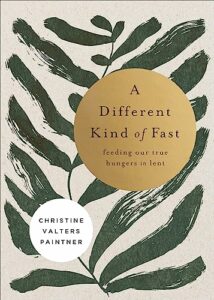 A Different Kind of Fast: Feeding Our True Hungers in Lent Christine Valters Paintner (Broadleaf) $19.99 // OUR SALE PRICE = $15.99
A Different Kind of Fast: Feeding Our True Hungers in Lent Christine Valters Paintner (Broadleaf) $19.99 // OUR SALE PRICE = $15.99 A Way Other Than Our Own: Devotions for Lent Walter Brueggemann (WJK) $16.00 // OUR SALE PRICE = $12.80
A Way Other Than Our Own: Devotions for Lent Walter Brueggemann (WJK) $16.00 // OUR SALE PRICE = $12.80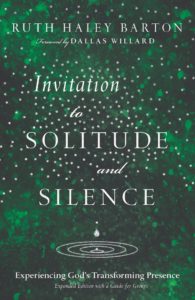 Invitation to Solitude and SIlence: Experiencing God’s Transforming Presence Ruth Haley Barton (IVP) $25.99 // OUR SALE PRICE = $20.79
Invitation to Solitude and SIlence: Experiencing God’s Transforming Presence Ruth Haley Barton (IVP) $25.99 // OUR SALE PRICE = $20.79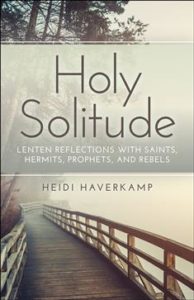 Holy Solitude: Lenten Reflection with Saints, Hermits, Prophets, and Rebels Heidi Haverkamp (WJK) $14.00 // OUR SALE PRICE = $11.29
Holy Solitude: Lenten Reflection with Saints, Hermits, Prophets, and Rebels Heidi Haverkamp (WJK) $14.00 // OUR SALE PRICE = $11.29 From Wilderness to Glory: Lent and Easter for Everyone N. T. Wright (WJK) $18.00 // OUR SALE PRICE = $14.40
From Wilderness to Glory: Lent and Easter for Everyone N. T. Wright (WJK) $18.00 // OUR SALE PRICE = $14.40 Prone to Wander: A Lenten Journey with Women in the Wilderness Joanna Harader (Herald Press) $16.99 // OUR SALE PRICE = $13.59
Prone to Wander: A Lenten Journey with Women in the Wilderness Joanna Harader (Herald Press) $16.99 // OUR SALE PRICE = $13.59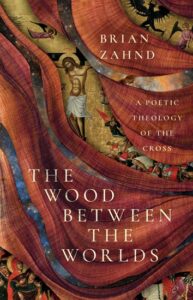 The Wood Between the Worlds: A Poetic Theology of the Cross Brian Zahnd (IVP) $24.00 // OUR SALE PRICE = $19.20
The Wood Between the Worlds: A Poetic Theology of the Cross Brian Zahnd (IVP) $24.00 // OUR SALE PRICE = $19.20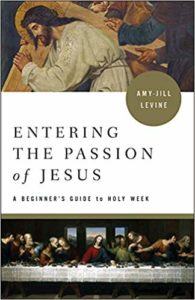
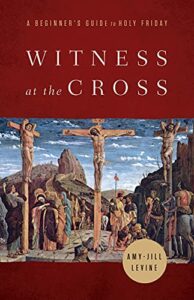 Entering the Passion of Jesus: A Beginners Guide to Holy Week and Witness at the Cross: A Beginners Guide to Holy Friday Amy-Jill Levine (Abingdon Press) $16.99 and $17.99 // OUR SALE PRICES = $13.59 and $14.39
Entering the Passion of Jesus: A Beginners Guide to Holy Week and Witness at the Cross: A Beginners Guide to Holy Friday Amy-Jill Levine (Abingdon Press) $16.99 and $17.99 // OUR SALE PRICES = $13.59 and $14.39 and its politics and methods. She has a strong, respectful, and some would say very helpful (nonChristian) bias, of course, which is part of the fun of these provocative studies.
and its politics and methods. She has a strong, respectful, and some would say very helpful (nonChristian) bias, of course, which is part of the fun of these provocative studies.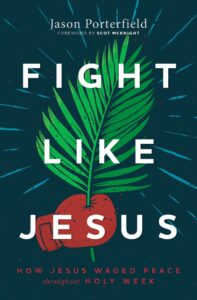 Fight Like Jesus: How Jesus Waged Peace Throughout Holy Week Jason Porterfield (Herald Press) $17.99
Fight Like Jesus: How Jesus Waged Peace Throughout Holy Week Jason Porterfield (Herald Press) $17.99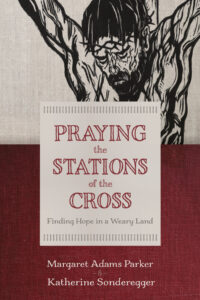 Praying the Stations of the Cross: Finding Hope in a Weary Land Margaret Adams Parker & Katherine Sonderegger (Eerdmans) $24.99 // OUR SALE PRICE = $19.99
Praying the Stations of the Cross: Finding Hope in a Weary Land Margaret Adams Parker & Katherine Sonderegger (Eerdmans) $24.99 // OUR SALE PRICE = $19.99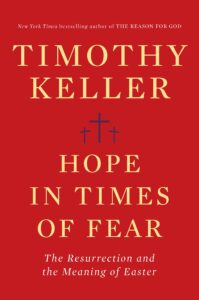 Hope in Times of Fear: The Resurrection and the Meaning of Easter Timothy Keller (Penguin) $17.00 // OUR SALE PRICE = $13.60
Hope in Times of Fear: The Resurrection and the Meaning of Easter Timothy Keller (Penguin) $17.00 // OUR SALE PRICE = $13.60 Easter: The Season of the Resurrection of Jesus Wesley Hill (IVP) $20.00 // OUR SALE PRICE = $16.00
Easter: The Season of the Resurrection of Jesus Wesley Hill (IVP) $20.00 // OUR SALE PRICE = $16.00 As I started to read Easter: The Season of the Resurrection of Jesus I’ll admit to you, dear readers, that I was a tad reluctant. I wanted to read this fresh, for the first time, on Easter. Alas, an occupational hazard here on the frontlines of bookselling, I had to read it early. I suspect if you order it from us now you just might succumb as well. It is so good.
As I started to read Easter: The Season of the Resurrection of Jesus I’ll admit to you, dear readers, that I was a tad reluctant. I wanted to read this fresh, for the first time, on Easter. Alas, an occupational hazard here on the frontlines of bookselling, I had to read it early. I suspect if you order it from us now you just might succumb as well. It is so good. Remissioning Church: A Field Guide to Bringing a Congregation Back to Life Josh Hayden (IVP) $20.00 // OUR SALE PRICE = $16.00
Remissioning Church: A Field Guide to Bringing a Congregation Back to Life Josh Hayden (IVP) $20.00 // OUR SALE PRICE = $16.00 1 Corinthians: A Theological, Pastoral, & Missional Commentary Michael J. Gorman (Eerdmans) $39.99 // OUR SALE PRICE = $31.99
1 Corinthians: A Theological, Pastoral, & Missional Commentary Michael J. Gorman (Eerdmans) $39.99 // OUR SALE PRICE = $31.99 Walking the Way of the Wise: A Biblical Theology of Wisdom Mitchell L. Chase (IVP)$26.00 // OUR SALE PRICE = $20.80
Walking the Way of the Wise: A Biblical Theology of Wisdom Mitchell L. Chase (IVP)$26.00 // OUR SALE PRICE = $20.80 In God’s Good Image: How Jesus Dignifies, Shapes, and Confronts Our Cultural Identities J.W. Buck (Herald Press) $19.99 // OUR SALE PRICE = $15.99
In God’s Good Image: How Jesus Dignifies, Shapes, and Confronts Our Cultural Identities J.W. Buck (Herald Press) $19.99 // OUR SALE PRICE = $15.99 The Fix: How the Twelve Steps Offer a Surprising Path of Transformation for the Well-Adjusted, the Down-and-Out, and Everyone in Between Ian Morgan Cron (Zondervan) $29.99 // OUR SALE PRICE = $23.99
The Fix: How the Twelve Steps Offer a Surprising Path of Transformation for the Well-Adjusted, the Down-and-Out, and Everyone in Between Ian Morgan Cron (Zondervan) $29.99 // OUR SALE PRICE = $23.99 interestingly, comes out on the heels of another similar book, the wonderful, new, thorough book by John Ortberg called Steps: A Guide to Transforming Your Life When Willpower Isn’t Enough (Tyndale; $19.99 // OUR SALE PRICE = $15.99.) I loved Ortberg’s introduction to the 12 steps of AA (for anyone) and am sure Ian’s new work — written, they say, with “his signature wit, wisdom, and transparency” — will help us understand the importance of these twelve steps and, perhaps, to “see the world in a startling new way.” That’s the promise on the back cover and I’m betting on it.
interestingly, comes out on the heels of another similar book, the wonderful, new, thorough book by John Ortberg called Steps: A Guide to Transforming Your Life When Willpower Isn’t Enough (Tyndale; $19.99 // OUR SALE PRICE = $15.99.) I loved Ortberg’s introduction to the 12 steps of AA (for anyone) and am sure Ian’s new work — written, they say, with “his signature wit, wisdom, and transparency” — will help us understand the importance of these twelve steps and, perhaps, to “see the world in a startling new way.” That’s the promise on the back cover and I’m betting on it. Knowing and Being Known: Hope for All Our Intimate Relationships Erin F. Moniz (IVP) $18.00 // OUR SALE PRICE = $14.40
Knowing and Being Known: Hope for All Our Intimate Relationships Erin F. Moniz (IVP) $18.00 // OUR SALE PRICE = $14.40 The God of Story: Discovering the Narrative of Scripture Through the Language of Storytelling Daneil Schwabauer (Baker) $18.99 // OUIR SALE PRICE = $15.19
The God of Story: Discovering the Narrative of Scripture Through the Language of Storytelling Daneil Schwabauer (Baker) $18.99 // OUIR SALE PRICE = $15.19 Cabin: Off the Grid Adventures with a Clueless Craftsman Patrick Hutchison (St. Martin’s Press) $29.00 // OUR SALE PRICE = $23.20
Cabin: Off the Grid Adventures with a Clueless Craftsman Patrick Hutchison (St. Martin’s Press) $29.00 // OUR SALE PRICE = $23.20 The Wages of Cinema: A Christian Aesthetic of Film in Conversation with Dorothy L. Sayers Crystal L. Downing (IVP Academic) $29.00 // OUR SALE PRICE = $23.20
The Wages of Cinema: A Christian Aesthetic of Film in Conversation with Dorothy L. Sayers Crystal L. Downing (IVP Academic) $29.00 // OUR SALE PRICE = $23.20 We Tell Ourselves Stories: Joan Didion and the American Dream Machine Alissa Wilkinson (Liveright) $29.99 // OUR SALE PRICE = $23.99
We Tell Ourselves Stories: Joan Didion and the American Dream Machine Alissa Wilkinson (Liveright) $29.99 // OUR SALE PRICE = $23.99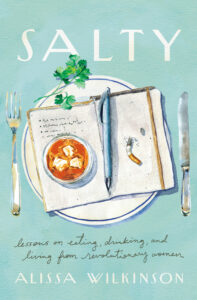 Christian worldview and has written a bit about the implications for a public theology for culture studies. She is a robust thinker, as her last book surely showed, the delightfully imaginative story of four famous women eating a meal together — Salty: Lessons on Eating, Drinking, and Living from Revolutionary Women (Broadleaf; $25.99 // OUR SALE PRICE = $20.19.) She does tend towards the important and profound.
Christian worldview and has written a bit about the implications for a public theology for culture studies. She is a robust thinker, as her last book surely showed, the delightfully imaginative story of four famous women eating a meal together — Salty: Lessons on Eating, Drinking, and Living from Revolutionary Women (Broadleaf; $25.99 // OUR SALE PRICE = $20.19.) She does tend towards the important and profound. Beautiful, Disappointing, Hopeful: How Gratitude, Grief, and Grace Reflect the Christian Story Drew Hyun (Zondervan) $19.99 // OUR SALE PRICE = $15.99
Beautiful, Disappointing, Hopeful: How Gratitude, Grief, and Grace Reflect the Christian Story Drew Hyun (Zondervan) $19.99 // OUR SALE PRICE = $15.99 The Anti-Greed Gospel: Why the Love of Money Is the Root of Racism and How the Church Can Create A New Way Forward Malcolm Foley (Brazos Press) $21.99 // OUR SALE PRICE = $17.59
The Anti-Greed Gospel: Why the Love of Money Is the Root of Racism and How the Church Can Create A New Way Forward Malcolm Foley (Brazos Press) $21.99 // OUR SALE PRICE = $17.59 The Deep-Rooted Marriage: Cultivating Intimacy, Healing, and Delight Dan B. Allender & Steve Call (Thomas Nelson) $29.99 // OUR SALE PRICE = $23.99
The Deep-Rooted Marriage: Cultivating Intimacy, Healing, and Delight Dan B. Allender & Steve Call (Thomas Nelson) $29.99 // OUR SALE PRICE = $23.99 The Traveler’s Path: Finding Spiritual Growth and Inspiration Through Travel Douglas J. Brouwer (The Reformed Journal Books) $22.00 // OUR SALE PRICE = $17.60
The Traveler’s Path: Finding Spiritual Growth and Inspiration Through Travel Douglas J. Brouwer (The Reformed Journal Books) $22.00 // OUR SALE PRICE = $17.60 Jesus Changes Everything: A New World Made Possible Stanley Hauerwas (Plough Publishing) $12.95 // OUR SALE PRICE = $10.36
Jesus Changes Everything: A New World Made Possible Stanley Hauerwas (Plough Publishing) $12.95 // OUR SALE PRICE = $10.36 Becoming the Pastor’s Wife: How Marriage Replaced Ordination as a Woman’s Path to Ministry Beth Allison Barr (Brazos Press) $24.99 // OUR SALE PRICE = $19.99
Becoming the Pastor’s Wife: How Marriage Replaced Ordination as a Woman’s Path to Ministry Beth Allison Barr (Brazos Press) $24.99 // OUR SALE PRICE = $19.99 With Child: Encountering God Alongside Mothers in the Bible Danielle Ayers Jones (Square Halo Books) $22.99 // OUR SALE PRICE = $18.39
With Child: Encountering God Alongside Mothers in the Bible Danielle Ayers Jones (Square Halo Books) $22.99 // OUR SALE PRICE = $18.39 Clay in the Potter’s Hands Diana Pavlac Glyer (Square Halo Books) $29.99 // OUR SALE PRICE = $23.99
Clay in the Potter’s Hands Diana Pavlac Glyer (Square Halo Books) $29.99 // OUR SALE PRICE = $23.99 Evangelism in an Age of Despair: Hope Beyond the Failed Promise of Happiness Andrew Root (Baker Academic) $29.99 // OUR SALE PRICE = $23.99
Evangelism in an Age of Despair: Hope Beyond the Failed Promise of Happiness Andrew Root (Baker Academic) $29.99 // OUR SALE PRICE = $23.99 The Disparate Ones: Essays on Being in the World but Not Of the World Marty Duren (Missional Press) $9.95 // OUR SALE PRICE = $7.96
The Disparate Ones: Essays on Being in the World but Not Of the World Marty Duren (Missional Press) $9.95 // OUR SALE PRICE = $7.96 Gather Me: A Memoir in Praise of the Books That Saved Me Glory Edim (Ballentine) $28.00 // OUR SALE PRICE = $22.40
Gather Me: A Memoir in Praise of the Books That Saved Me Glory Edim (Ballentine) $28.00 // OUR SALE PRICE = $22.40 Kitchen Hymns: Poems Padraig O’Tuama (Copper Canyon Press) $17.00 // OUR SALE PRICE = $13.60
Kitchen Hymns: Poems Padraig O’Tuama (Copper Canyon Press) $17.00 // OUR SALE PRICE = $13.60 The Tears of Things: Prophetic Wisdom for An Age of Outrage Richard Rohr (Convergence) $27.00 // OUR SALE PRICE = $21.60
The Tears of Things: Prophetic Wisdom for An Age of Outrage Richard Rohr (Convergence) $27.00 // OUR SALE PRICE = $21.60 Healing Affluenza and Resisting Plutocracy: Luke’s Jesus and Sabbath Economics Ched Myers (Fortress Press) $45.00
Healing Affluenza and Resisting Plutocracy: Luke’s Jesus and Sabbath Economics Ched Myers (Fortress Press) $45.00 What If Jesus Was Serious About Justice: A Visual Guide to the Good News of God’s Judgement and Mercy Skye Jethani (Brazos Press) $18.99 // OUR SALE PRICE = $15.19
What If Jesus Was Serious About Justice: A Visual Guide to the Good News of God’s Judgement and Mercy Skye Jethani (Brazos Press) $18.99 // OUR SALE PRICE = $15.19 Truth Matters: A Dialogue on Fruitful Disagreement in an Age of Division Robert P. George & Cornel West (Post Hill Press) $19.99 // OUR SALE PRICE = $15.99
Truth Matters: A Dialogue on Fruitful Disagreement in an Age of Division Robert P. George & Cornel West (Post Hill Press) $19.99 // OUR SALE PRICE = $15.99 Take What You Need: Soft Words for Hard Days Aundi Kolber (Tyndale) $19.99 // OUR SALE PRICE = $15.99
Take What You Need: Soft Words for Hard Days Aundi Kolber (Tyndale) $19.99 // OUR SALE PRICE = $15.99 Money Lies and God: Inside the Movement to Destroy American Democracy Katherine Stewart (Bloomsbury) $29.99 // OUR SALE PRICE = $23.99
Money Lies and God: Inside the Movement to Destroy American Democracy Katherine Stewart (Bloomsbury) $29.99 // OUR SALE PRICE = $23.99 Called to to Friends, Called to Serve Paul Marshall (Cascade) $22.00 // OUR SALE PRICE = $17.60
Called to to Friends, Called to Serve Paul Marshall (Cascade) $22.00 // OUR SALE PRICE = $17.60 Black in Blues: How a Color Tells the Story of My People Imani Perry (Ecco) $28.99 // OUR SALE PRICE = $23.19
Black in Blues: How a Color Tells the Story of My People Imani Perry (Ecco) $28.99 // OUR SALE PRICE = $23.19 Living Out of Control: Political & Personal Faith in Waning Christendom Rodney Clapp (Fortress Press) $25.00 // OUR SALE PRICE = $20.00
Living Out of Control: Political & Personal Faith in Waning Christendom Rodney Clapp (Fortress Press) $25.00 // OUR SALE PRICE = $20.00 Your Names Are Written in Heaven: The World of Rose Busingye David Perillo (Slant Books) $19.00 // OUR SALE PRICE = $15.20
Your Names Are Written in Heaven: The World of Rose Busingye David Perillo (Slant Books) $19.00 // OUR SALE PRICE = $15.20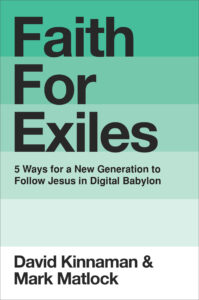 As I said at my own home church recently, if we hope to attract younger adults and young professionals we simply have to present this kind of big vision, wide-as-life, relevant, incarnational vision of God’s Kingdom. If you don’t believe me, read, for instance, chapter four in Faith for Exiles: 5 Ways for a New Generation to Follow Jesus in Digital Babylon by David Kinnaman & Mark Matlock (Baker; $21.99 // this week only on sale for 30% off = $15.39.) It mentions our work at the Jubilee book display, in passing, to make a bigger point about the practice of offering vocational discipleship for this particularly ambitious generation.
As I said at my own home church recently, if we hope to attract younger adults and young professionals we simply have to present this kind of big vision, wide-as-life, relevant, incarnational vision of God’s Kingdom. If you don’t believe me, read, for instance, chapter four in Faith for Exiles: 5 Ways for a New Generation to Follow Jesus in Digital Babylon by David Kinnaman & Mark Matlock (Baker; $21.99 // this week only on sale for 30% off = $15.39.) It mentions our work at the Jubilee book display, in passing, to make a bigger point about the practice of offering vocational discipleship for this particularly ambitious generation. Birds in the Sky, Fish in the Sea: Attending to Creation with Delight and Wonder Matthew Dickerson and Matthew L. Clark (Square Halo Books) $25.99 // OUR 30% OFF SALE PRICE = $18.19
Birds in the Sky, Fish in the Sea: Attending to Creation with Delight and Wonder Matthew Dickerson and Matthew L. Clark (Square Halo Books) $25.99 // OUR 30% OFF SALE PRICE = $18.19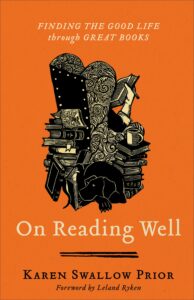 On Reading Well: Finding the Good Life through Great Books Karen Swallow Prior (Brazos Press) $23.00 // OUR 30% OFF SALE PRICE = $16.10
On Reading Well: Finding the Good Life through Great Books Karen Swallow Prior (Brazos Press) $23.00 // OUR 30% OFF SALE PRICE = $16.10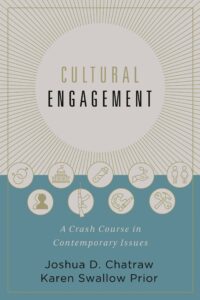 Cultural Engagement: A Crash Course in Contemporary Issues edited by Karen Swallow Prior & Joshua Chatraw (Zondervan) $39.99 // OUR 30% OFF SALE PRICE = $27.99
Cultural Engagement: A Crash Course in Contemporary Issues edited by Karen Swallow Prior & Joshua Chatraw (Zondervan) $39.99 // OUR 30% OFF SALE PRICE = $27.99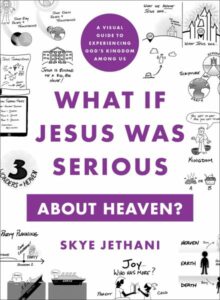 What If Jesus Was Serious About Heaven? Skye Jethani (Brazos Press) $ 16.99 // OUR 30% OFF SALE PRICE = $11.89
What If Jesus Was Serious About Heaven? Skye Jethani (Brazos Press) $ 16.99 // OUR 30% OFF SALE PRICE = $11.89 Faithful Is Successful: Notes to the Driven Pilgrim edited by Nathan Grills,
Faithful Is Successful: Notes to the Driven Pilgrim edited by Nathan Grills,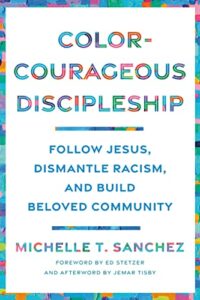 Color Courageous Discipleship: Follow Jesus, Dismantle Racism, and Build Beloved Community Michelle T. Sanchez (Waterbrook) $18.00 // OUR 30% OFF SALE PRICE = $12.60
Color Courageous Discipleship: Follow Jesus, Dismantle Racism, and Build Beloved Community Michelle T. Sanchez (Waterbrook) $18.00 // OUR 30% OFF SALE PRICE = $12.60 Black Women Grief: A Guide to Hope and Wholeness Natasha Smith (IVP) $18.00 // OUR 30% OFF SALE PRICE = $12.60
Black Women Grief: A Guide to Hope and Wholeness Natasha Smith (IVP) $18.00 // OUR 30% OFF SALE PRICE = $12.60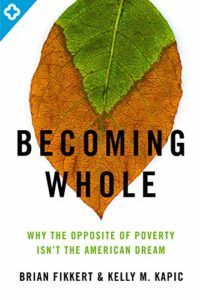 Becoming Whole: Why the Opposite of Poverty Isn’t the American Dream Brian Fikkert & Kelly M. Kapic (Moody Press) $15.99 // OUR 30% OFF SALE PRICE = $11.19
Becoming Whole: Why the Opposite of Poverty Isn’t the American Dream Brian Fikkert & Kelly M. Kapic (Moody Press) $15.99 // OUR 30% OFF SALE PRICE = $11.19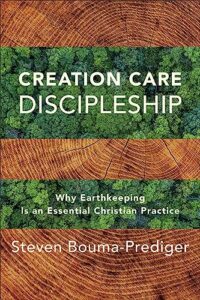 Creation-Care Discipleship: Why Earthkeeping Is an Essential Christian Practice Steven Bouma-Prediger (Baker Academic) $25.99 // OUR 30% OFF SALE PRICE = $18.19
Creation-Care Discipleship: Why Earthkeeping Is an Essential Christian Practice Steven Bouma-Prediger (Baker Academic) $25.99 // OUR 30% OFF SALE PRICE = $18.19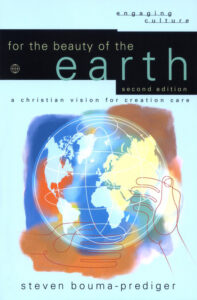
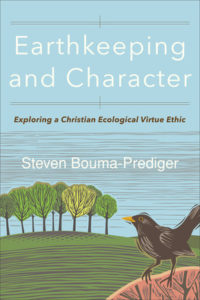 Of all the many books we have on this topic we are most likely to show off to anyone interested the four or five books by our friend Steve Bouma-Prediger. Of all his books — from the must-read For the Beauty of the Earth ($28.00 // $19.60) to a personal favorite, the excellent Earthkeeping and Character ($27.00 // $18.90) — we were so glad for this recent one that came out last year. We named it a Book of the Year and were thrilled that he was speaking at Jubilee 2025. It is a decisive work, making the case that creation-care is no mere sideline hobby or even a specialty ministry for those called to such things. No, creation care is intregal to — not incidental — to our daily discipleship. If we want to be a faithful follower of King Jesus, part of the big story of God’s redemptive work in the world, working to serve and protect (and restore) our planet is simply part of the calling. It is a delight, come to think of it, but a true part of the job description.
Of all the many books we have on this topic we are most likely to show off to anyone interested the four or five books by our friend Steve Bouma-Prediger. Of all his books — from the must-read For the Beauty of the Earth ($28.00 // $19.60) to a personal favorite, the excellent Earthkeeping and Character ($27.00 // $18.90) — we were so glad for this recent one that came out last year. We named it a Book of the Year and were thrilled that he was speaking at Jubilee 2025. It is a decisive work, making the case that creation-care is no mere sideline hobby or even a specialty ministry for those called to such things. No, creation care is intregal to — not incidental — to our daily discipleship. If we want to be a faithful follower of King Jesus, part of the big story of God’s redemptive work in the world, working to serve and protect (and restore) our planet is simply part of the calling. It is a delight, come to think of it, but a true part of the job description.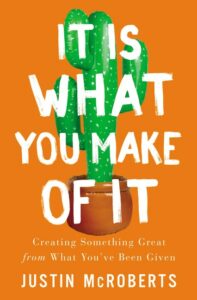 It Is What You Make of It: Creating Something Great from What You’ve Been Given Justin McRoberts (Thomas Nelson) $18.99 // OUR 30% OFF SALE PRICE = $13.29
It Is What You Make of It: Creating Something Great from What You’ve Been Given Justin McRoberts (Thomas Nelson) $18.99 // OUR 30% OFF SALE PRICE = $13.29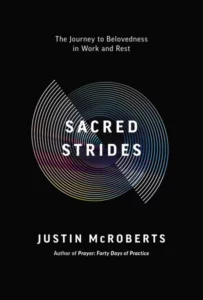 cactus shown on the cover — you won’t want to miss it. I loved this book,
cactus shown on the cover — you won’t want to miss it. I loved this book, 3 Big Questions That Shape Your Future Kara Powell, Kristel Acevedo and Brad Griffin (Baker) $17.99 // OUR 30% OFF SALE PRICE = $12.59
3 Big Questions That Shape Your Future Kara Powell, Kristel Acevedo and Brad Griffin (Baker) $17.99 // OUR 30% OFF SALE PRICE = $12.59 Believe: Why Everyone Should Be Religious Ross Douthat (Zondervan) $29.99 // OUR 30% OFF SALE PRICE = $20.99
Believe: Why Everyone Should Be Religious Ross Douthat (Zondervan) $29.99 // OUR 30% OFF SALE PRICE = $20.99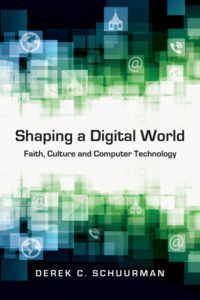 Shaping a Digital World: Faith, Culture and Computer Technology Derek Schuurman (IVP) $20.99
Shaping a Digital World: Faith, Culture and Computer Technology Derek Schuurman (IVP) $20.99 Science and Faith in Harmony: Contemplations on a Distilled Doxology Sy Garte (Kregel) $21.99 // OUR 30% OFF SALE PRICE = $15.39
Science and Faith in Harmony: Contemplations on a Distilled Doxology Sy Garte (Kregel) $21.99 // OUR 30% OFF SALE PRICE = $15.39 Citizenship Without Illusions: A Christian Guide to Political Engagement David T. Koyzis (IVP) $18.00 // OUR 30% OFF SALE PRICE = $12.60
Citizenship Without Illusions: A Christian Guide to Political Engagement David T. Koyzis (IVP) $18.00 // OUR 30% OFF SALE PRICE = $12.60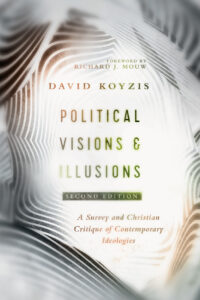 extraordinary Political Visions and Illusions: A Survey & Christian Critique of Contemporary Ideologies ($35.99 // $25.19 — this week only) which calls us away from ideologies of the right and the left, exploring the landscape of political theorists and movements to help us be discerning about them, following by the shattering, compelling claim that followers of the Lamb are not fundamentally loyal to any of these secularizing visions and unwise principles. (I say almost perfect as I might nitpick a bit with some of his astute claims and I might wish it wasn’t quite so academic/philosophical. It is, nonetheless, a very, very important volume!) We have pressed it into the hands of poly sci majors and politicos, but these days we all need to dive deeper into political theory so we’re glad to have it at 30% off this week. I can hardly think of a more important book to read in this season of political and constitutional crisis.
extraordinary Political Visions and Illusions: A Survey & Christian Critique of Contemporary Ideologies ($35.99 // $25.19 — this week only) which calls us away from ideologies of the right and the left, exploring the landscape of political theorists and movements to help us be discerning about them, following by the shattering, compelling claim that followers of the Lamb are not fundamentally loyal to any of these secularizing visions and unwise principles. (I say almost perfect as I might nitpick a bit with some of his astute claims and I might wish it wasn’t quite so academic/philosophical. It is, nonetheless, a very, very important volume!) We have pressed it into the hands of poly sci majors and politicos, but these days we all need to dive deeper into political theory so we’re glad to have it at 30% off this week. I can hardly think of a more important book to read in this season of political and constitutional crisis.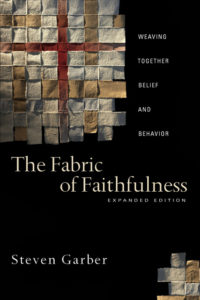 The Fabric of Faithfulness: Weaving Together Belief and Behavior Steven Garber (IVP) $24.99 // OUR 30% OFF SALE PRICE = $17.49
The Fabric of Faithfulness: Weaving Together Belief and Behavior Steven Garber (IVP) $24.99 // OUR 30% OFF SALE PRICE = $17.49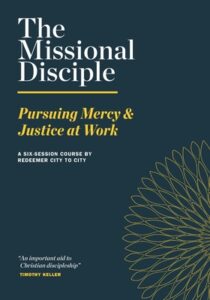 The Missional Disciple: Pursuing Mercy & Justice at Work Redeemer City-to-City (Redeemer City to City) $14.99 // OUR 30% OFF SALE PRICE = $10.49
The Missional Disciple: Pursuing Mercy & Justice at Work Redeemer City-to-City (Redeemer City to City) $14.99 // OUR 30% OFF SALE PRICE = $10.49 Kudos to the exceptional leader, Missy Wallace, who was involved in this and graced us at Jubilee Pro and the Jubilee conference. We so love this workbook so while we’re at it we’ll put on deep discount the other handsome Redeemer City-to-City study, too: Go Forth: God’s Purpose for Your Work (Redeemer City-to-City) ($12.99 // this week only, $9.09.)
Kudos to the exceptional leader, Missy Wallace, who was involved in this and graced us at Jubilee Pro and the Jubilee conference. We so love this workbook so while we’re at it we’ll put on deep discount the other handsome Redeemer City-to-City study, too: Go Forth: God’s Purpose for Your Work (Redeemer City-to-City) ($12.99 // this week only, $9.09.) We are now taking pre-orders, by the way for Missy Wallace’s forthcoming book (coming within the month), co-authored with Lauren Gill, which will be called Faith & Work: Galvanizing Your Church for Everyday Impact (100 Movements Press.) There will be a substantive foreword by their main mentor, the legendary Katherine Leary Alsdorf. Send us a note and we’ll get you on the waiting list; we’ll let you know of the price and our sale offer as soon we know.
We are now taking pre-orders, by the way for Missy Wallace’s forthcoming book (coming within the month), co-authored with Lauren Gill, which will be called Faith & Work: Galvanizing Your Church for Everyday Impact (100 Movements Press.) There will be a substantive foreword by their main mentor, the legendary Katherine Leary Alsdorf. Send us a note and we’ll get you on the waiting list; we’ll let you know of the price and our sale offer as soon we know.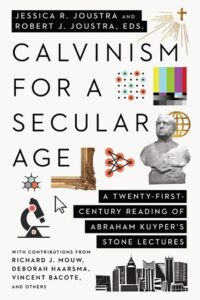 Calvinism for a Secular Age: A Twenty First Century Reading of Abraham Kuyper’s Stone Lectures Jessica Joustra (IVP Academic) $28.99 // OUR 30% OFF SALE PRICE = $20.29
Calvinism for a Secular Age: A Twenty First Century Reading of Abraham Kuyper’s Stone Lectures Jessica Joustra (IVP Academic) $28.99 // OUR 30% OFF SALE PRICE = $20.29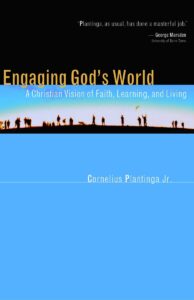 Engaging God’s World: A Christian Vision of Faith, Learning, and Living Cornelius Planting (Eerdmans) $19.99
Engaging God’s World: A Christian Vision of Faith, Learning, and Living Cornelius Planting (Eerdmans) $19.99 The Evangelical Imagination: How Stories, Images, & Metaphors Created a Culture in Crisis Karen Swallow Prior (Brazos Press) $26.99
The Evangelical Imagination: How Stories, Images, & Metaphors Created a Culture in Crisis Karen Swallow Prior (Brazos Press) $26.99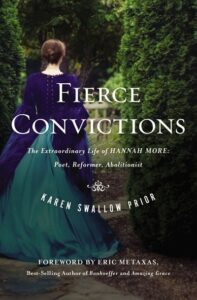 By the way, don’t miss Karen’s one-of-a-kind biography of the great writer and anti-slavery activist Hannah More, one of the influential members of the early-to-mid-1800s Clapham group of William Wilberforce. Called Fierce Convictions: The Extraordinary Life of Hannah More: Poet, Reformer, Abolitionist published by Thomas Nelson; $24.99 — our 30% off sale price this week = $17.49.) Of course we had it at Jubilee and we only wish we had had time to highlight its true importance. Hooray.
By the way, don’t miss Karen’s one-of-a-kind biography of the great writer and anti-slavery activist Hannah More, one of the influential members of the early-to-mid-1800s Clapham group of William Wilberforce. Called Fierce Convictions: The Extraordinary Life of Hannah More: Poet, Reformer, Abolitionist published by Thomas Nelson; $24.99 — our 30% off sale price this week = $17.49.) Of course we had it at Jubilee and we only wish we had had time to highlight its true importance. Hooray. Our Church Speaks: An Illustrated Devotional of Saints from Every Era and Place Ben Lansing and D.J. Morotta (IVP) $24.00
Our Church Speaks: An Illustrated Devotional of Saints from Every Era and Place Ben Lansing and D.J. Morotta (IVP) $24.00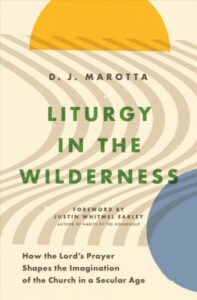 contemporary relevance and fidelity.
contemporary relevance and fidelity.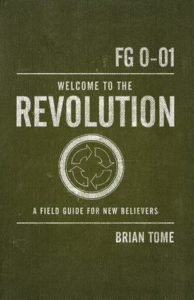 Welcome to the Revolution: A Field Guide for New Believers Brian Tome (Thomas Nelson) $12.99
Welcome to the Revolution: A Field Guide for New Believers Brian Tome (Thomas Nelson) $12.99 The next one, which will drop in a week or so, will be related to the upcoming
The next one, which will drop in a week or so, will be related to the upcoming  Jubilee 2025 will be a blast with
Jubilee 2025 will be a blast with Lent: The Season of Repentance and Renewal Esau McCaulley (IVP) $20.99 // OUR SALE PRICE = $16.79
Lent: The Season of Repentance and Renewal Esau McCaulley (IVP) $20.99 // OUR SALE PRICE = $16.79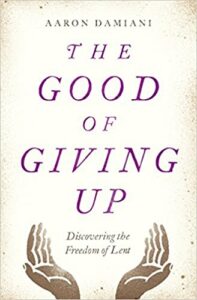 The Good of Giving Up: Discovering the Freedom of Lent Aaron Damiani (Moody Press) $12.99 // OUR SALE PRICE = $10.39
The Good of Giving Up: Discovering the Freedom of Lent Aaron Damiani (Moody Press) $12.99 // OUR SALE PRICE = $10.39 Turning Over Tables: A Lenten Call for Disrupting Power Kathy Escobar (WJK) $17.00 // OUR SALE PRICE = $13.60
Turning Over Tables: A Lenten Call for Disrupting Power Kathy Escobar (WJK) $17.00 // OUR SALE PRICE = $13.60 Hunger for Righteousness: A Lenten Journey Towards Intimacy with God and Loving our Neighbor Phoebe Farah Mikhail (Paraclete) $18.99 //
Hunger for Righteousness: A Lenten Journey Towards Intimacy with God and Loving our Neighbor Phoebe Farah Mikhail (Paraclete) $18.99 //  The Stones of the Last Week: Impediments to Easter Bonnie B. Thurston (Liturgical Press) $12.95 // OUR SALE PRICE = $10.36
The Stones of the Last Week: Impediments to Easter Bonnie B. Thurston (Liturgical Press) $12.95 // OUR SALE PRICE = $10.36 Unrevealed Until Its Season: A Lenten Journey with Hymns James C. Howell (Upper Room Books) $14.99 // OUR SALE PRICE = $11.99
Unrevealed Until Its Season: A Lenten Journey with Hymns James C. Howell (Upper Room Books) $14.99 // OUR SALE PRICE = $11.99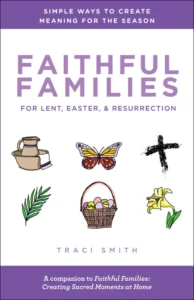 Faithful Families for Lent, Easter, & Resurrection Traci Smith (Chalice Press) $12.99 // OUR SALE PRICE = $10.39
Faithful Families for Lent, Easter, & Resurrection Traci Smith (Chalice Press) $12.99 // OUR SALE PRICE = $10.39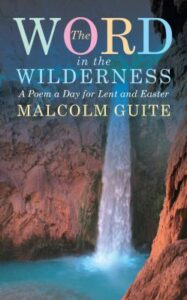 The Word in the Wilderness: A Poem a Day for Lent and Easter Malcolm Guite (Canterbury Press) $21.00 // OUR SALE PRICE = $16.80
The Word in the Wilderness: A Poem a Day for Lent and Easter Malcolm Guite (Canterbury Press) $21.00 // OUR SALE PRICE = $16.80 To the Cross: Proclaiming the Gospel from the Upper Room to Calvary Christopher J. H. Wright (IVP) $16.99 // OUR SALE PRICE = $13.59
To the Cross: Proclaiming the Gospel from the Upper Room to Calvary Christopher J. H. Wright (IVP) $16.99 // OUR SALE PRICE = $13.59 Where the Eye Alights: Phrases for the Forty Days of Lent Marilyn McEntyre (Eerdmans) $20.99 // OUR SALE PRICE = $16.79
Where the Eye Alights: Phrases for the Forty Days of Lent Marilyn McEntyre (Eerdmans) $20.99 // OUR SALE PRICE = $16.79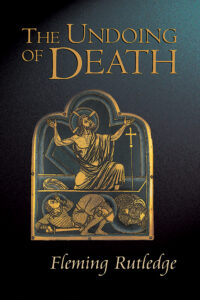 The Undoing of Death Fleming Rutledge (Eerdmans) $26.99 // OUR SALE PRICE = $21.59
The Undoing of Death Fleming Rutledge (Eerdmans) $26.99 // OUR SALE PRICE = $21.59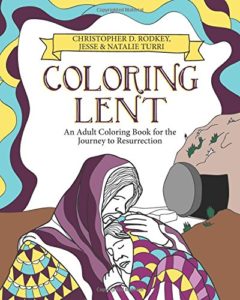 Coloring Lent: An Adult Coloring Book for the Journey to Resurrection Christopher Rodkey, illustrated by Jesse Turri (CBP/Chalice Press) $12.99 // OUR SALE PRICE = $10.39
Coloring Lent: An Adult Coloring Book for the Journey to Resurrection Christopher Rodkey, illustrated by Jesse Turri (CBP/Chalice Press) $12.99 // OUR SALE PRICE = $10.39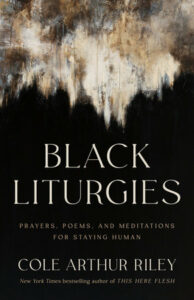 Black Liturgies: Prayers, Poems, and Meditations for Staying Human Cole Arthur Riley (Convergent) $22.00 // OUR SALE PRICE = $17.60
Black Liturgies: Prayers, Poems, and Meditations for Staying Human Cole Arthur Riley (Convergent) $22.00 // OUR SALE PRICE = $17.60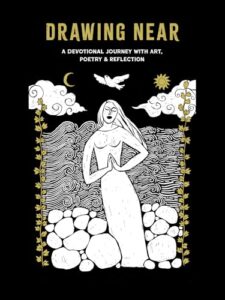
 Midwinter Light: Meditations for the Long Season Marilyn McEntyre (Broadleaf Books) $19.99 // OUR SALE PRICE = $15.99
Midwinter Light: Meditations for the Long Season Marilyn McEntyre (Broadleaf Books) $19.99 // OUR SALE PRICE = $15.99 Beautiful, Disappointing, Hopeful: How Gratitude, Grief, and Grace Reflect the Christian Story Drew Hyun (ZondervanReflective) $19.99 // OUR SALE PRICE = $15.99
Beautiful, Disappointing, Hopeful: How Gratitude, Grief, and Grace Reflect the Christian Story Drew Hyun (ZondervanReflective) $19.99 // OUR SALE PRICE = $15.99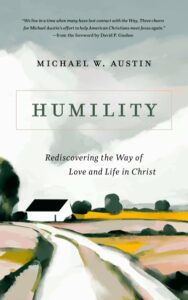 Humility: Rediscovering the Way of Love and Life in Christ Michael W. Austin (Eerdmans) $24.99 // OUR SALE PRICE = $19.99
Humility: Rediscovering the Way of Love and Life in Christ Michael W. Austin (Eerdmans) $24.99 // OUR SALE PRICE = $19.99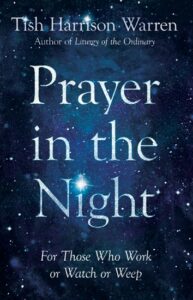 Prayer in the Night: For Those Who Work or Watch or Weep Tish Warren Harrison (IVP) $22.99 // OUR SALE PRICE = $18.39
Prayer in the Night: For Those Who Work or Watch or Weep Tish Warren Harrison (IVP) $22.99 // OUR SALE PRICE = $18.39 Prayers from the Cloud: 100 Prayers Through the Ages Pete James (Eerdmans) $22.99 // OUR SALE PRICE = $18.39
Prayers from the Cloud: 100 Prayers Through the Ages Pete James (Eerdmans) $22.99 // OUR SALE PRICE = $18.39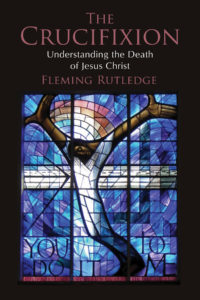 The C
The C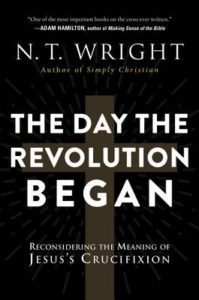 The Day the Revolution Began: Reconsidering the Meaning of Jesus’s Crucifixion N.T. Wright (HarperOne) $19.99 // OUR SALE PRICE = $15.99
The Day the Revolution Began: Reconsidering the Meaning of Jesus’s Crucifixion N.T. Wright (HarperOne) $19.99 // OUR SALE PRICE = $15.99 Lamb of the Free: Recovering the Varied Sacrificial Understandings of Jesus’s Death Andrew Remington Roller (Cascade) $39.00 // OUR SALE PRICE = $31.20
Lamb of the Free: Recovering the Varied Sacrificial Understandings of Jesus’s Death Andrew Remington Roller (Cascade) $39.00 // OUR SALE PRICE = $31.20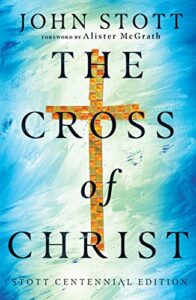
 The Snakehead:
The Snakehead:  Enrique’s Journey: The Story of a Boy’s Dangerous Odyssey to Reunite with His Mother Sonia Nazario (random House) $18.00 // OUR SALE PRICE = $14.40
Enrique’s Journey: The Story of a Boy’s Dangerous Odyssey to Reunite with His Mother Sonia Nazario (random House) $18.00 // OUR SALE PRICE = $14.40 Solito: A Memoir Javier Zamora (Hogarth Press) $18.00
Solito: A Memoir Javier Zamora (Hogarth Press) $18.00 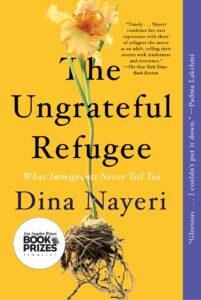 The Ungrateful Refugee: What Immigrants Never Tell You Dina Nayeri (Catapult) $17.95 // OUR SALE PRICE = $14.36
The Ungrateful Refugee: What Immigrants Never Tell You Dina Nayeri (Catapult) $17.95 // OUR SALE PRICE = $14.36 What We Remember Will Be Saved: A Story of Refugees and the Things They Carry Stephanie Saldana (Broadleaf) $28.99
What We Remember Will Be Saved: A Story of Refugees and the Things They Carry Stephanie Saldana (Broadleaf) $28.99 A Journey Called Hope: Today’s Immigrant Stories and the American Dream Rick Rouse (Chalice Press) $19.99
A Journey Called Hope: Today’s Immigrant Stories and the American Dream Rick Rouse (Chalice Press) $19.99  All Saints: The Surprising True Story of How Refugees from Burma Brought Life to a Dying Church Michael Spurlock & Jeanette Windle (Bethany House) $13.99
All Saints: The Surprising True Story of How Refugees from Burma Brought Life to a Dying Church Michael Spurlock & Jeanette Windle (Bethany House) $13.99 They Come Back Singing: Finding God with the Refugees Gary Smith, SJ (Loyola Press) $14.95 // OUR SALE PRICE = $11.96
They Come Back Singing: Finding God with the Refugees Gary Smith, SJ (Loyola Press) $14.95 // OUR SALE PRICE = $11.96 When Stars Are Scattered Victoria Jamieson and Omar Mohamed (Penguin) $12.99 // OUR SALE PRICE = $10.39
When Stars Are Scattered Victoria Jamieson and Omar Mohamed (Penguin) $12.99 // OUR SALE PRICE = $10.39 Separated by the Border: A Birth Mother, A Foster Mother, and a Migrant Child’s 3,000 Mile Journey Gene Thomas (IVP) $18.99 // OUR SALE PRICE = $15.19
Separated by the Border: A Birth Mother, A Foster Mother, and a Migrant Child’s 3,000 Mile Journey Gene Thomas (IVP) $18.99 // OUR SALE PRICE = $15.19 Everyone Who Is Gone Is Here: The United States, Central America, and the Making of a Crisis Jonathan Blitzer (Penguin) $21.00
Everyone Who Is Gone Is Here: The United States, Central America, and the Making of a Crisis Jonathan Blitzer (Penguin) $21.00  PRE-ORDER NOW The Asylum Seekers: A Chronicle of Life, Death, and Community at the Border Cristina Rathbone (Broadleaf Books) $28.99 // OUR SALE PRICE = $23.19 // NOT YET RELEASED – DUE MARCH 18, 2025
PRE-ORDER NOW The Asylum Seekers: A Chronicle of Life, Death, and Community at the Border Cristina Rathbone (Broadleaf Books) $28.99 // OUR SALE PRICE = $23.19 // NOT YET RELEASED – DUE MARCH 18, 2025 Start With Welcome: The Journey toward a Confident and Compassionate Immigration Conversation Bri Stensrud (Zondervan) $19.99
Start With Welcome: The Journey toward a Confident and Compassionate Immigration Conversation Bri Stensrud (Zondervan) $19.99 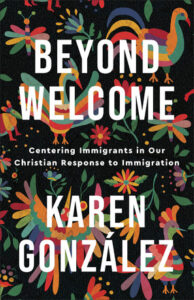 Beyond Welcome: Centering Immigrants in Our Christian Response to Immigration Karen Gonzalez (Brazos Press) $18.99 // OUR SALE PRICE = $15.19
Beyond Welcome: Centering Immigrants in Our Christian Response to Immigration Karen Gonzalez (Brazos Press) $18.99 // OUR SALE PRICE = $15.19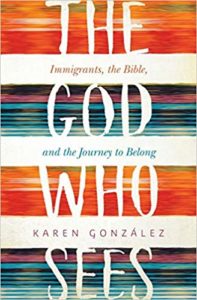 The God Who Sees: Immigrants, the Bible, and the Journey to Belong Karen Gonzalez (Herald Press) $16.99 // OUR SALE PRICE = $13.59
The God Who Sees: Immigrants, the Bible, and the Journey to Belong Karen Gonzalez (Herald Press) $16.99 // OUR SALE PRICE = $13.59 You Welcomed Me: Loving Refugees and Immigrants Because God First Loved Us Kent Annan (IVP) $16.99 // OUR SALE PRICE = $13.59
You Welcomed Me: Loving Refugees and Immigrants Because God First Loved Us Kent Annan (IVP) $16.99 // OUR SALE PRICE = $13.59 Neighbor: Christian Encounters with “Illegal” Immigration Ben Daniel (WJK) $19.95 // OUR SALE PRICE = $15.96
Neighbor: Christian Encounters with “Illegal” Immigration Ben Daniel (WJK) $19.95 // OUR SALE PRICE = $15.96 Serving God in a Migrant Crisis Patrick Johnston with Dean Merrill (IVP) $15.99 // OUR SALE PRICE = $12.79
Serving God in a Migrant Crisis Patrick Johnston with Dean Merrill (IVP) $15.99 // OUR SALE PRICE = $12.79 Welcoming the Stranger: Justice, Compassion & Truth in the Immigration Debate Revised and Expanded Matthew Soerens & Jenny Yang (IVP) $22.99 // OUR SALE PRICE = $18.39
Welcoming the Stranger: Justice, Compassion & Truth in the Immigration Debate Revised and Expanded Matthew Soerens & Jenny Yang (IVP) $22.99 // OUR SALE PRICE = $18.39 The Bible and Borders: Hearing God’s Word on Immigration M. Daniel Carroll R. (Brazos Press) $20.00 // OUR SALE PRICE = $16.00
The Bible and Borders: Hearing God’s Word on Immigration M. Daniel Carroll R. (Brazos Press) $20.00 // OUR SALE PRICE = $16.00 Seeking Refuge – On the Shores of the Global Refugee Crisis Stephan Bauman, Matthew Soerens, and Dr. Issam Smear (Moody Press) $13.99 // OUR SALE PRICE = $11.19
Seeking Refuge – On the Shores of the Global Refugee Crisis Stephan Bauman, Matthew Soerens, and Dr. Issam Smear (Moody Press) $13.99 // OUR SALE PRICE = $11.19 Finding Jesus at the Border: Opening Our Hearts to the Stories of Our Immigrant Neighbors Julia Lambert Fogg (Brazos Press) $22.00 // OUR SALE PRICE = $17.60
Finding Jesus at the Border: Opening Our Hearts to the Stories of Our Immigrant Neighbors Julia Lambert Fogg (Brazos Press) $22.00 // OUR SALE PRICE = $17.60 Our God Is Undocumented: Biblical Faith and Immigrant Justice Ched Myers & Matthew Cowell (Orbis Press) $26.00 // OUR SALE PRICE = $20.80
Our God Is Undocumented: Biblical Faith and Immigrant Justice Ched Myers & Matthew Cowell (Orbis Press) $26.00 // OUR SALE PRICE = $20.80 Strangers and Scapegoats: Extending God’s Welcome to Those on the Margins Matthew S. Cos (Baker Academic) $24.99 // OUR SALE PRICE = $19.99
Strangers and Scapegoats: Extending God’s Welcome to Those on the Margins Matthew S. Cos (Baker Academic) $24.99 // OUR SALE PRICE = $19.99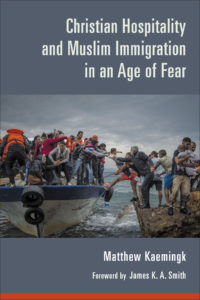 Christian Hospitality and Muslim Immigration in an Age of Fear Matthew Kaemingk (Eerdmans) $32.50 // OUR SALE PRICE = $26.00
Christian Hospitality and Muslim Immigration in an Age of Fear Matthew Kaemingk (Eerdmans) $32.50 // OUR SALE PRICE = $26.00 Migrants and Citizens: Justice and Responsibility in the Ethics of Immigration by Tisha Rajendra (Eerdmans) $26.50 // OUR SALE PRICE = $21.20
Migrants and Citizens: Justice and Responsibility in the Ethics of Immigration by Tisha Rajendra (Eerdmans) $26.50 // OUR SALE PRICE = $21.20 Refuge Reimagined: Biblical Kinship in Global Politics Mark R. Glanville & Luke Glanville (IVP Academic) $28.99 // OUR SALE PRICE = $23.19
Refuge Reimagined: Biblical Kinship in Global Politics Mark R. Glanville & Luke Glanville (IVP Academic) $28.99 // OUR SALE PRICE = $23.19 Discerning Welcome: A Reformed Faith Approach to Refugees Ellen Clark Clemot (Cascade) $21.00 // OUR SALE PRICE = $16.80
Discerning Welcome: A Reformed Faith Approach to Refugees Ellen Clark Clemot (Cascade) $21.00 // OUR SALE PRICE = $16.80 Immigrant Neighbors Among Us: Immigration Across Theological Traditions edited by M. Daniel Carroll R. & Leopoldo A.Sanchez M. (Pickwick) $25.00 // OUR SALE PRICE = $20.00
Immigrant Neighbors Among Us: Immigration Across Theological Traditions edited by M. Daniel Carroll R. & Leopoldo A.Sanchez M. (Pickwick) $25.00 // OUR SALE PRICE = $20.00 White Borders: The History of Race and Immigration in the United States from Chinese Exclusion to the Border Wall Reece Jones (Beacon Press) $25.95 // OUR SALE PRICE = $20.76
White Borders: The History of Race and Immigration in the United States from Chinese Exclusion to the Border Wall Reece Jones (Beacon Press) $25.95 // OUR SALE PRICE = $20.76 Jesus the Refugee: Ancient Injustice and Modern Solidarity D. Glenn Butner, Jr. (Fortress Press) $25.00 // OUR SALE PRICE = $20.00
Jesus the Refugee: Ancient Injustice and Modern Solidarity D. Glenn Butner, Jr. (Fortress Press) $25.00 // OUR SALE PRICE = $20.00
 Church on the Way: Hospitality and Migration Nell Becker Sweeden (Pickwick) $28.00 // OUR SALE PRICE = $22.40
Church on the Way: Hospitality and Migration Nell Becker Sweeden (Pickwick) $28.00 // OUR SALE PRICE = $22.40 Jesus, King of Strangers: What the Bible Really Say About Immigration Mark Hamilton (Eerdmans) $23.99 // OUR SALE PRICE = $19.19
Jesus, King of Strangers: What the Bible Really Say About Immigration Mark Hamilton (Eerdmans) $23.99 // OUR SALE PRICE = $19.19 Eight Million Exiles: Missional Action Research and the Crisis of Forced Migration Christopher M. Hays (Eerdmans) $24.99 // OUR SALE PRICE = $19.99
Eight Million Exiles: Missional Action Research and the Crisis of Forced Migration Christopher M. Hays (Eerdmans) $24.99 // OUR SALE PRICE = $19.99 Defiant Hope: Essays on Life, Faith, and Freedom Michael Gerson (Simon & Schuster) $28.99 // OUR SALE PRICE = $23.19
Defiant Hope: Essays on Life, Faith, and Freedom Michael Gerson (Simon & Schuster) $28.99 // OUR SALE PRICE = $23.19 Stolen Price: Loss, Shame, and the Rise of the Right Arlie Russell Hochschild (The New Press) $30.99 // OUR SALE PRICE = $24.79
Stolen Price: Loss, Shame, and the Rise of the Right Arlie Russell Hochschild (The New Press) $30.99 // OUR SALE PRICE = $24.79 Practicing the Way: Be with Jesus, Become Like Him, Do as He Did John Mark Comer (Waterbrook) $26.00 // OUR SALE PRICE = $20.80
Practicing the Way: Be with Jesus, Become Like Him, Do as He Did John Mark Comer (Waterbrook) $26.00 // OUR SALE PRICE = $20.80 Rags of Light: Leonard Cohen and the Landscape of Biblical Imagination Brian J. Walsh (Cascade) $23.99 // OUR SALE PRICE = $19.19
Rags of Light: Leonard Cohen and the Landscape of Biblical Imagination Brian J. Walsh (Cascade) $23.99 // OUR SALE PRICE = $19.19 White Poverty: How Exposing Myths about Race and Class Can Reconstruct American Democracy Reverend Dr. William J. Barber II with Jonathan Wilson-Hartgrove (Liveright) $22.99 // OUR SALE PRICE = $18.39
White Poverty: How Exposing Myths about Race and Class Can Reconstruct American Democracy Reverend Dr. William J. Barber II with Jonathan Wilson-Hartgrove (Liveright) $22.99 // OUR SALE PRICE = $18.39 Makers by Nature: Letters from a Master painter on Faith, Hope, and Art Bruce Herman (IVP Academic) $28.00 // OUR SALE PRICE = $22.40
Makers by Nature: Letters from a Master painter on Faith, Hope, and Art Bruce Herman (IVP Academic) $28.00 // OUR SALE PRICE = $22.40 Why Everything That Doesn’t Matter Matters So Much: The Way of Love in a World of Hurt Charlie Peacock & Andi Ashworth (W Publishing Group) $19.99 // OUR SALE PRICE = $15.99
Why Everything That Doesn’t Matter Matters So Much: The Way of Love in a World of Hurt Charlie Peacock & Andi Ashworth (W Publishing Group) $19.99 // OUR SALE PRICE = $15.99 Van Gogh Has a Broken Heart: What Art Teaches Us About the Wonder and Struggle of Being Alive Russ Ramsey (Zondervan) $29.99 // OUR SALE PRICE = $23.99
Van Gogh Has a Broken Heart: What Art Teaches Us About the Wonder and Struggle of Being Alive Russ Ramsey (Zondervan) $29.99 // OUR SALE PRICE = $23.99 Reconciliation in a Michigan Watershed: Restoring Ken-O-Sha Gail Gunst Heffner & David P. Warners (Michigan State University Press) $29.95 // OUR SALE PRICE = $23.96
Reconciliation in a Michigan Watershed: Restoring Ken-O-Sha Gail Gunst Heffner & David P. Warners (Michigan State University Press) $29.95 // OUR SALE PRICE = $23.96 The Eighth Moon: A Memoir of Belonging and Rebellion Jennifer Kabat (Milkweed Editions) $18.00 // OUR SALE PRICE = $14.40
The Eighth Moon: A Memoir of Belonging and Rebellion Jennifer Kabat (Milkweed Editions) $18.00 // OUR SALE PRICE = $14.40 Even After Everything: The Spiritual Practice of Knowing the Risks and Loving Anyway Stephanie Duncan Smith (Convergent) $26.00 // OUR SALE PRICE = $20.80
Even After Everything: The Spiritual Practice of Knowing the Risks and Loving Anyway Stephanie Duncan Smith (Convergent) $26.00 // OUR SALE PRICE = $20.80 Sacredness of Secular Work: 4 Ways Your Job Matters for Eternity (Even When Your Not Sharing the Gospel) Jordan Raynor (Waterbrook) $25.00 // OUR SALE PRICE = $20.00
Sacredness of Secular Work: 4 Ways Your Job Matters for Eternity (Even When Your Not Sharing the Gospel) Jordan Raynor (Waterbrook) $25.00 // OUR SALE PRICE = $20.00 The Servant Layer: Facing the Challenges of Christian Faith in Everyday Law Practice Robert F. Cochran, Jr. (IVP Academic) $28.00 // OUR SALE PRICE = $22.40
The Servant Layer: Facing the Challenges of Christian Faith in Everyday Law Practice Robert F. Cochran, Jr. (IVP Academic) $28.00 // OUR SALE PRICE = $22.40 Thriving on a Riff: Jazz and the Spiritual Life William C. Carter (Broadleaf Books) $26.99 // OUR SALE PRICE = $21.59
Thriving on a Riff: Jazz and the Spiritual Life William C. Carter (Broadleaf Books) $26.99 // OUR SALE PRICE = $21.59 Plundered: The Tangled Roots of Racial and Environmental Injustice David W. Swanson (IVP) $18.00 // OUR SALE PRICE = $14.40
Plundered: The Tangled Roots of Racial and Environmental Injustice David W. Swanson (IVP) $18.00 // OUR SALE PRICE = $14.40 The New Testament in Color: A Multiethnic Bible Commentary edited by Esau McCaulley, Janette H. Ok, Osvaldo Padilla, & Amy Peeler (IVP Academic) $60.00// OUR SALE PRICE = $48.00
The New Testament in Color: A Multiethnic Bible Commentary edited by Esau McCaulley, Janette H. Ok, Osvaldo Padilla, & Amy Peeler (IVP Academic) $60.00// OUR SALE PRICE = $48.00 Jesus and the Powers: Christian Political Witness in an Age of Totalitarian Terror and Dysfunctional Democracies N. T. Wright & Michael Bird (Zondervan) $22.99 // OUR SALE PRICE = $18.39
Jesus and the Powers: Christian Political Witness in an Age of Totalitarian Terror and Dysfunctional Democracies N. T. Wright & Michael Bird (Zondervan) $22.99 // OUR SALE PRICE = $18.39 Faithful Politics: Ten Approaches to Christian Citizenship and Why It Matters Miranda Zapor Cruz (IVP Academic) $24.00 // OUR SALE PRICE = $19.20
Faithful Politics: Ten Approaches to Christian Citizenship and Why It Matters Miranda Zapor Cruz (IVP Academic) $24.00 // OUR SALE PRICE = $19.20 The Age of Grievance Frank Bruni (Avid Readers Press) $28.99 // OUR SALE PRICE = $23.19
The Age of Grievance Frank Bruni (Avid Readers Press) $28.99 // OUR SALE PRICE = $23.19 They Flew: A History of the Impossible Carols Eire (Yale University Press) $35.00 // OUR SALE PRICE = $28.00
They Flew: A History of the Impossible Carols Eire (Yale University Press) $35.00 // OUR SALE PRICE = $28.00 Get the Picture: A Mind-Bending Journey Among the Inspired Artists and Obsessive Art Fiends Who Taught Me How to See Bianca Booker (Viking) $29.00 // OUR SALE PRICE = $23.20
Get the Picture: A Mind-Bending Journey Among the Inspired Artists and Obsessive Art Fiends Who Taught Me How to See Bianca Booker (Viking) $29.00 // OUR SALE PRICE = $23.20 Break, Blow, Burn, & Make: A Writer’s Thoughts on Creation E. Lily Yu (Worthy) $27.00 // OUR SALE PRICE = $21.60
Break, Blow, Burn, & Make: A Writer’s Thoughts on Creation E. Lily Yu (Worthy) $27.00 // OUR SALE PRICE = $21.60 Aslan’s Breath: Seeing the Holy Spirit in Narnia Matthew Dickerson (Square Halo Books) $19.99 // OUR SALE PRICE = $15.99
Aslan’s Breath: Seeing the Holy Spirit in Narnia Matthew Dickerson (Square Halo Books) $19.99 // OUR SALE PRICE = $15.99 Through Middle Eastern Eyes: A Life of Kenneth E. Bailey Michael Parker (Wipf & Stock) $29.99 // OUR SALE PRICE = $23.99
Through Middle Eastern Eyes: A Life of Kenneth E. Bailey Michael Parker (Wipf & Stock) $29.99 // OUR SALE PRICE = $23.99 Living in Wonder: Finding Mystery and Meaning in a Secular Age Rod Dreher (Zondervan Reflective) $29.99 // OUR SALE PRICE = $23.99
Living in Wonder: Finding Mystery and Meaning in a Secular Age Rod Dreher (Zondervan Reflective) $29.99 // OUR SALE PRICE = $23.99 Backroads and Better Angels: A Journey into the Heart of American Democracy Francis S. Barry (Steer Forth Press) $35.00 / OUR SALE PRICE = $28.00
Backroads and Better Angels: A Journey into the Heart of American Democracy Francis S. Barry (Steer Forth Press) $35.00 / OUR SALE PRICE = $28.00 Rocky Mountain High: A Tale of Boom and Bust in the New Wild West Finn Murphy (Norton) $17.99 // OUR SALE PRICE = $14.39
Rocky Mountain High: A Tale of Boom and Bust in the New Wild West Finn Murphy (Norton) $17.99 // OUR SALE PRICE = $14.39 All The Worst Humans: How I Made News for Dictators, Tycoons, and Politicians Phil Elwood (Holt) $28.99 // OUR SALE PRICE = $23.19
All The Worst Humans: How I Made News for Dictators, Tycoons, and Politicians Phil Elwood (Holt) $28.99 // OUR SALE PRICE = $23.19 Roots and Rhythm: A Life in Music Charlie Peacock (Eerdmans) $32.99 / OUR SALE PRICE = $26.39
Roots and Rhythm: A Life in Music Charlie Peacock (Eerdmans) $32.99 / OUR SALE PRICE = $26.39 Peacock — a stage name, by the way — came up in the West Coast almost punk scene but before that was taken with jazz. His great, great grandfather from Louisiana was a fiddler. His dad was a high school band leader, and good at it. We learn that young Charlie, who married his high school sweetheart, Andi, when they were still teens, was reading On the Road and The Dharma Bums and was serious about drugs and drinking; he was a truly ambitious and multi-talented kid and grew and his telling of listening to TV shows like Shindig, American Bandstand and Soul Train. One of the first songs he wrote that got sold went to the producers of The Monkees. He was into Dylan and James Taylor and Jackson and eventually would
Peacock — a stage name, by the way — came up in the West Coast almost punk scene but before that was taken with jazz. His great, great grandfather from Louisiana was a fiddler. His dad was a high school band leader, and good at it. We learn that young Charlie, who married his high school sweetheart, Andi, when they were still teens, was reading On the Road and The Dharma Bums and was serious about drugs and drinking; he was a truly ambitious and multi-talented kid and grew and his telling of listening to TV shows like Shindig, American Bandstand and Soul Train. One of the first songs he wrote that got sold went to the producers of The Monkees. He was into Dylan and James Taylor and Jackson and eventually would But, also, he was a major player in the CCM world that was the backdrop to so many of our best friends and customers and events here at the shop. I loved reading the stories of the world-class famous — he’s friends with Vince Gill,
But, also, he was a major player in the CCM world that was the backdrop to so many of our best friends and customers and events here at the shop. I loved reading the stories of the world-class famous — he’s friends with Vince Gill, It isn’t a big part of this decades-spanning memoir, but he and his wife, Andi, did just release a strong collection of pieces — written as letters — that we’ve raved about earlier this year. Called Why Everthing That Doesn’t Matter Matters So Much. It’s fabulous.
It isn’t a big part of this decades-spanning memoir, but he and his wife, Andi, did just release a strong collection of pieces — written as letters — that we’ve raved about earlier this year. Called Why Everthing That Doesn’t Matter Matters So Much. It’s fabulous. Between Two Trailers: A Memoir J. Dana Trent (Convergent) $27.00 / OUR SALE PRICE = $21.60
Between Two Trailers: A Memoir J. Dana Trent (Convergent) $27.00 / OUR SALE PRICE = $21.60 Splinters: Another Kind of Love Story Leslie Jamison (Little Brown) $29.00 / OUR SALE PRICE = $23.20
Splinters: Another Kind of Love Story Leslie Jamison (Little Brown) $29.00 / OUR SALE PRICE = $23.20 My Life in Seventeen Books: A Literary Memoir Jon M. Sweeney (Monkfish) $23.00 / OUR SALE PRICE = $18.40
My Life in Seventeen Books: A Literary Memoir Jon M. Sweeney (Monkfish) $23.00 / OUR SALE PRICE = $18.40 Somehow: Thoughts on Love Anne Lamott (Riverhead Books) $22.00 / OUR SALE PRICE = $17.60
Somehow: Thoughts on Love Anne Lamott (Riverhead Books) $22.00 / OUR SALE PRICE = $17.60
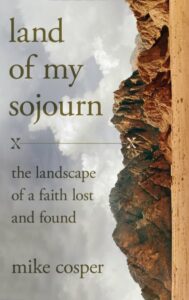 Land of My Sojourn: The Landscape of a Faith Lost and Found Mike Cosper (IVP) $24.00 / OUR SALE PRICE = $19.20
Land of My Sojourn: The Landscape of a Faith Lost and Found Mike Cosper (IVP) $24.00 / OUR SALE PRICE = $19.20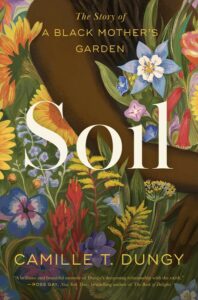 Soil: The Story of a Black Mother’s Garden Camille Dungy (Simon & Schuster) $19.99 / OUR SALE PRICE = $15.99
Soil: The Story of a Black Mother’s Garden Camille Dungy (Simon & Schuster) $19.99 / OUR SALE PRICE = $15.99 Biting the Hand: Growing Up Asian in Black and White American Julia Lee (Holt) $26.99 / OUR SALE PRICE = $21.59
Biting the Hand: Growing Up Asian in Black and White American Julia Lee (Holt) $26.99 / OUR SALE PRICE = $21.59 1974: A Personal History Francine Prose(Harper) $27.99 / OUR SALE PRICE = $22.39
1974: A Personal History Francine Prose(Harper) $27.99 / OUR SALE PRICE = $22.39 The MAGA Diaries: My Surreal Adventures Inside the Right Wing (And How I Got Out) Tina Nguyen (Atria) $28.00 / OUR SALE PRICE = $22.40
The MAGA Diaries: My Surreal Adventures Inside the Right Wing (And How I Got Out) Tina Nguyen (Atria) $28.00 / OUR SALE PRICE = $22.40 Motorhome Prophecies: A Journey of Healing and Forgiveness Carrie Sheffield (Center Street) $29.00 / OUR SALE PRICE = $23.20
Motorhome Prophecies: A Journey of Healing and Forgiveness Carrie Sheffield (Center Street) $29.00 / OUR SALE PRICE = $23.20 What the Taliban Told Me Ian Fritz (Simon & Schuster) $29.99 / OUR SALE PRICE = $23.99
What the Taliban Told Me Ian Fritz (Simon & Schuster) $29.99 / OUR SALE PRICE = $23.99
 Books from Hearts & Minds” podcast — in the most recent I describe with enthusiasm an adult book on Epiphany (by Fleming Rutledge) and two beautiful children’s books. Enjoy that by either watching on YouTube or listening at Spotify or Apple Podcasts. The one before that was sort of about the holiday season — a book on hospitality, one on wine, and one on a Kingdom vision for family called Households of Faith. Both of those pods are timely, so check ‘em out.
Books from Hearts & Minds” podcast — in the most recent I describe with enthusiasm an adult book on Epiphany (by Fleming Rutledge) and two beautiful children’s books. Enjoy that by either watching on YouTube or listening at Spotify or Apple Podcasts. The one before that was sort of about the holiday season — a book on hospitality, one on wine, and one on a Kingdom vision for family called Households of Faith. Both of those pods are timely, so check ‘em out.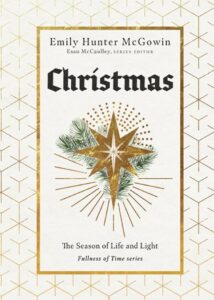 Christmas: The Season of Life and Light Emily Hunter McGowin (IVP) $21.99 // OUR SALE PRICE = $17.59
Christmas: The Season of Life and Light Emily Hunter McGowin (IVP) $21.99 // OUR SALE PRICE = $17.59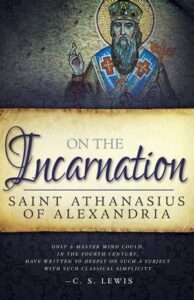 On the Incarnation Saint Athanasius of Alexandria (Whitaker House) $9.99
On the Incarnation Saint Athanasius of Alexandria (Whitaker House) $9.99 One of Us: Reflections on the Radical Mystery of the Incarnation A.D. Bauer (Square Halo Books) $16.99 // OUR SALE PRICE = $13.59
One of Us: Reflections on the Radical Mystery of the Incarnation A.D. Bauer (Square Halo Books) $16.99 // OUR SALE PRICE = $13.59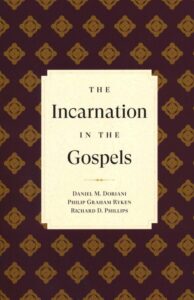 The Incarnation in the Gospels Daniel Doriani, Philip Graham Ryken & Richard Phillips (P&R) $14.99 // OUR SALE PRICE = $11.99
The Incarnation in the Gospels Daniel Doriani, Philip Graham Ryken & Richard Phillips (P&R) $14.99 // OUR SALE PRICE = $11.99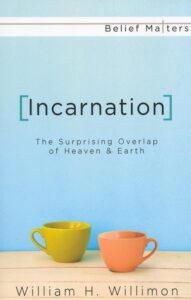 Incarnation: The Surprising Overlap of Heaven and Earth William Willimon (Abingdon) $15.99 // OUR SALE PRICE = $12.79
Incarnation: The Surprising Overlap of Heaven and Earth William Willimon (Abingdon) $15.99 // OUR SALE PRICE = $12.79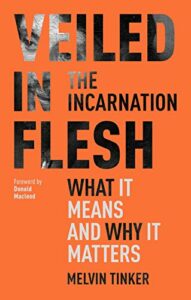 Veiled in Flesh: The Incarnation – What It Means and Why It Matters Melvin Tinker (IVP-UK) $17.00 // OUR SALE PRICE = $13.60
Veiled in Flesh: The Incarnation – What It Means and Why It Matters Melvin Tinker (IVP-UK) $17.00 // OUR SALE PRICE = $13.60 The Word Became Flesh: Evangelicals and the Incarnation edited by David Peterson (Paternoster Press) $24.99 // OUR SALE PRICE = $19.99
The Word Became Flesh: Evangelicals and the Incarnation edited by David Peterson (Paternoster Press) $24.99 // OUR SALE PRICE = $19.99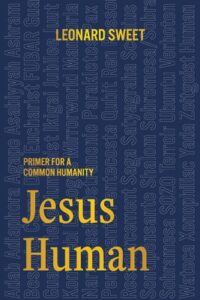 Jesus Human: Primer for a Common Humanity Leonard Sweet (The Salish Sea Press) $27.95 // OUR SALE PRICE = $22.36
Jesus Human: Primer for a Common Humanity Leonard Sweet (The Salish Sea Press) $27.95 // OUR SALE PRICE = $22.36 Divinity and Humanity: The Incarnation Reconsidered Oliver Crisp (Cambridge University Press) $42.99
Divinity and Humanity: The Incarnation Reconsidered Oliver Crisp (Cambridge University Press) $42.99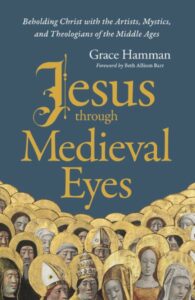 Jesus Through Medieval Eyes: Beholding Christ with the Artists, My stick, and Theologians of the Middle Ages Grace Harman (Zondervan Reflective) $24.99 // OUR SALE PRICE = $19.99
Jesus Through Medieval Eyes: Beholding Christ with the Artists, My stick, and Theologians of the Middle Ages Grace Harman (Zondervan Reflective) $24.99 // OUR SALE PRICE = $19.99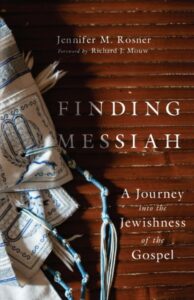 Finding Messiah: A Journey into the Jewishness of Jesus Jennifer M. Rosner (IVP) $17.99 // OUR SALE PRICE = $14.39
Finding Messiah: A Journey into the Jewishness of Jesus Jennifer M. Rosner (IVP) $17.99 // OUR SALE PRICE = $14.39 The Emotional Life of our Lord B. B. Warfield (Crossway) $8.99 // OUR SALE PRICE = $7.19
The Emotional Life of our Lord B. B. Warfield (Crossway) $8.99 // OUR SALE PRICE = $7.19 Passions of the Christ: The Emotional Life of Jesus in the Gospels F. Scott Spencer (Baker Academic) $32.99 // OUR SALE PRICE = $26.39
Passions of the Christ: The Emotional Life of Jesus in the Gospels F. Scott Spencer (Baker Academic) $32.99 // OUR SALE PRICE = $26.39
 Christ Unabridged: Knowing and Loving the Son of Man edited by George Westhaver & Rebekah Vince (SCM) $48.00 // OUR SALE PRICE = $38.40
Christ Unabridged: Knowing and Loving the Son of Man edited by George Westhaver & Rebekah Vince (SCM) $48.00 // OUR SALE PRICE = $38.40 Seeing as Jesus Sees: How a New Perspective Can Defeat the Darkness and Awaken Joy Alan Wright (Baker) $24.99
Seeing as Jesus Sees: How a New Perspective Can Defeat the Darkness and Awaken Joy Alan Wright (Baker) $24.99 His Face Like Mine: Finding God’s Love in Our Wounds Russell W. Joyce (IVP) $18.00 // OUR SALE PRICE = $14.40
His Face Like Mine: Finding God’s Love in Our Wounds Russell W. Joyce (IVP) $18.00 // OUR SALE PRICE = $14.40 Engaging Jesus with Our Senses: An Embodied Approach to the Gospels Jeannine Marie Hanger (Baker Academic) $24.99 // OUR SALE PRICE = $19.99
Engaging Jesus with Our Senses: An Embodied Approach to the Gospels Jeannine Marie Hanger (Baker Academic) $24.99 // OUR SALE PRICE = $19.99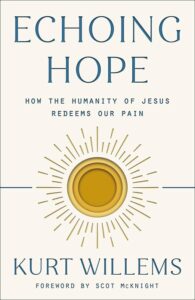
 Jesus and the Pleasures J. Christian Wilson (Augsburg-Fortress) $14.99 // OUR SALE PRICE = $11.99
Jesus and the Pleasures J. Christian Wilson (Augsburg-Fortress) $14.99 // OUR SALE PRICE = $11.99 Flesh-and-Blood Jesus: Learning to be Fully Human from the Son of Man Dan Russ (Baker) $14.99 // OUR SALE PRICE = $11.99
Flesh-and-Blood Jesus: Learning to be Fully Human from the Son of Man Dan Russ (Baker) $14.99 // OUR SALE PRICE = $11.99 A God Named Josh: Uncovering the Human Life of Jesus Christ Jared Brock (Bethany House) $19.00 // OUR SALE PRICE = $15.20
A God Named Josh: Uncovering the Human Life of Jesus Christ Jared Brock (Bethany House) $19.00 // OUR SALE PRICE = $15.20 The Word Fulfilled: Reading the Bible with Jesus Michael Pahl (Herald Press) $19.99 // OUR SALE PRICE = $15.99
The Word Fulfilled: Reading the Bible with Jesus Michael Pahl (Herald Press) $19.99 // OUR SALE PRICE = $15.99